PhD in Health Law, Policy, and Management

Program: Health Law, Policy, and Management
Degree: Doctor of Philosophy
Credits: 73
Length of Program: 4 years/8 Semesters
Format: Hybrid
Our PhD in Health Law, Policy, and Management equips students with the knowledge and skills needed to delve deeper into the root causes of health outcomes among population groups. This interdisciplinary degree is designed to enable students to develop distinctive and pioneering approaches and interventions to tackling complex issues in an increasingly evolving health system.
Students will have the opportunity to be a part of the only doctoral program in health law, policy, and management that directly incorporates the Political Determinants of Health framework by Daniel E. Dawes. By learning from Dean Dawes himself, as well as other top-ranked faculty, who incorporate his framework into effectuating change at the most upstream levels to have the greatest impact on moving the health equity needle forward. This program will be the first to apply such a unique lens across countries that may be facing similar challenges and sharing novelle approaches to developing solutions together.
What to Expect:
- The PhD in Health Law, Policy, and Management requires completion of a minimum of 73 credit hours, including choosing a dissertation topic and research. Classes will be held virtually with select in-person sessions at our Meharry Medical College campus.
- This program is intended to accommodate the working adult; therefore, courses are offered during the day and evenings.
- Students will engage with world-class faculty who are passionate health equity champions, bringing a wealth of knowledge and professional experience to the classroom from various spaces including the Centers for Disease Control and Prevention, The White House, the United States Congress, World Health Organization, United Nations General Assembly, U.S. Department of Health and Human Services, Health Insurers, Biopharmaceuticals, Biotechnology, Medical Device Companies, Disparities & Health Equity Research, Law & Policy, Responsible Artificial Intelligence, Geographic Information Systems, Medicine, Public Health, Management, Urban & Regional Planning, Clinical Trials, and more.
- This program aims to provide both domestic and global professional and scholarly experiences. Additionally, students will participate in distinguished lectureship series and skill-based workshops.
- Incoming PhD students will be individually matched with renowned subject matter experts and leaders to support them through their academic and professional endeavors.
Students looking to participate in this program come from a variety of professions and training backgrounds The SGH PhD candidate is well-rounded and looking to expand their knowledge and experience of the intricacies of navigating and managing health law and policy in global health. Students who wish to pursue this program will have already –in some way, shape, or form, begun working on this endeavor to advance health equity. At their core, these individuals are health equity champions within their own ecosystem, and will come from a variety of professional and academic backgrounds. Some examples include public health, medicine, nursing, allied health, mental and behavioral health, STEM, social sciences, political science, health law and policy, justice and advocacy work, social work, community health work, etc.
While there is no one perfect mold, the ideal candidates will be:
- self-motivated,
- bring their intellectual curiosity and lived experiences – both personal and professional, into the classroom,
- engaged in various health-related topics both in and outside of the classroom,
- and committed to the advancement of health equity for all.
This program is fully accredited by the Southern Association of Colleges and Schools Commission on Colleges.
Admissions Requirements:
Applicants must satisfy all admission requirements. Final admission decisions will be made by the School of Global Health Faculty Admissions Committee (FAC). Admission decisions will be based on all aspects of the application, including:
(1) Prior college-level academic performance of the applicant in a baccalaureate or master’s program at a regionally-accredited institution, including coursework and independent research projects
(2) Prior and/or relevant work experience
(3) Your personal statement and short answer responses submitted via the application portal
(4) Your three recommendation letters requested through the application portal
(5) Test scores are optional: graduate level test scores may be submitted if you believe it will enhance your overall application
Application Deadline Fall 2024
Priority Deadline for Scholarship consideration – December 1
General Deadline – March 1
*All documentation must be submitted by deadline date.
Application Process
The Faculty Admissions Committee cannot review any application until all documents have been received. Applicants may check the status of their application by logging into their online account.
Complete a formal application here: https://go.mmc.edu/apply/
- Select School of Global Health to access the PhD in Health Law, Policy, and Management Application
- Complete Personal Statement prompt: All applicants are required to provide a personal statement answering the question below. The response should be a of minimum 500 words, Times New Roman font, font size 12. I) What does health equity mean to you? II) How will you utilize your degree to advance your career? The student is encouraged to discuss lived experiences (academic, professional, or personal) in their response.”
- What one outstanding contribution do you hope to provide to the inaugural program cohort?
- Based on your academic or professional experience(s), describe your contributions towards eliminating health inequities/disparities in your immediate environment.
- Identify one factor in your past experiences that has been most influential in your decision to address global health inequities.
Gather your application documents:
- Letters of Recommendation
Three letters of recommendation are required, at least two of which must be from an academic mentor (major professor, thesis advisor, etc.) who can speak to the applicant’s potential to undertake graduate studies.
- Official transcripts
Applicants must submit official transcripts of coursework attempted and completed at all previous colleges and universities whether or not a degree was earned at the institution. Please ask your institution to send official college transcripts electronically directly to the School of Global Health at [email protected] .
If the institution prefers to mail transcripts, please use this address:
School of Global Health
Meharry Medical College 3401 West End Avenue Suite 160 Nashville, TN 37203
All submitted transcripts become the property of the Meharry Medical College and will not be returned.
Test Scores (specified below) The GRE, GMAT or any other admissions test score requirement is optional for applicants applying to the School of Global Health. Should an applicant wish to submit them for admissions consideration, please send them directly to Meharry Medical College electronically.
Final Decision
- Once all documents have been appropriately submitted to School, they will be reviewed by the SGH Faculty Admissions Committee.
- Applicants being considered for the PhD in Health Law, Policy, and Management must undergo an interview, SGH will contact applicants directly to coordinate a designated date and time.
- All applicants will receive a final decision response by e-mail.
Admitted Students
- Accept your admission decision by submitting your seat deposit. This will be sent via e-mail.
- Complete your FAFSA and make sure to send information to Meharry Medical College.
- Our central Office of Admissions and Recruitment at Meharry Medical College will contact you to begin your journey as a Meharrian.
To learn more about financial aid at Meharry visit: https://home.mmc.edu/financial-aid/
- All applicants possessing a baccalaureate degree must have earned a minimum cumulative GPA of 3.0 (on a 4-point scale) in the last 60 semester hours (approximately two years of work).
- Applicants possessing a master’s degree must have earned a minimum cumulative GPA of 3.0 (on a 4-point scale).
- Applicants possessing a baccalaureate degree including some graduate work, but not a graduate degree, must have earned a minimum cumulative GPA of 3.0 (on a 4-point scale) individually in both sets of coursework.
Prior Degrees: Educational equivalent of at least a bachelor’s degree in fields of or relating to health, healthcare, population health, etc., such as health administration, health science, health education, public health, clinical sciences, health policy, or other related disciplines from a regionally accredited university in the U.S. (United States). At this time this program is unable to accept international applicants. For questions please contact us at [email protected] .
Degrees Accepted While we do not look for any specific degree, students applying to this program should have a vested interest in population health outcomes academically, whether directly or indirectly, and the aptitude to successfully complete the coursework. Successful admission into the program will be contingent upon a holistic approach.
- Competency in a second focus area that complements the applicant’s previous degree(s) in one of the preferred fields identified above, as demonstrated by completion of a major, minor, or certificate in one of these areas.
- Relevant coursework that provides an international perspective or relevant coursework that provides understanding on foundational health disparities and inequities, surveillance of diseases, public/health policy, and their analyses.
- Evidence of relevant research or work experience, including, but not limited to, demonstrated participation in health science, health management, health equity, public health, organizational leadership, health policy, international relations, etc., and artifacts such as authored research reports, journal publications, or grey literature that demonstrate the applicant’s research aptitude and communications ability.
Core Coursework:
- Social, Mental, and Behavioral Health (3)
- Political Determinants of Health (3)
- Health Disparities and Health Equity (3)
- Foundations in Health Policy/Law (3)
- Introduction to Health Economics (3)
Total: 15 Credit Hours
*Courses and course title are still in review process and subject to change.
Specialization coursework (include total credit hours and course names in a list): Students are expected to complete 46 credit hours in specific coursework geared towards varying topics related to factors affecting health outcomes.
Students who enroll in the PhD in Health Law, Policy, and Management program will be exposed to a wide spectrum of coursework such as but not limited to:
- Applied Legal Epidemiology
- Emerging Technology
- International Law
- Policy Design and Writing
- Policy in Global Health Practice
- Persuasive Policy Communication
- Practice and Leadership of Health Policy and Health Equity
- Advanced Health Economics Approaches
- Justice Theory and Health
In addition, students will have the opportunity to gain exposure to health disparity/equity research abroad or domestically, through an applied learning experience.
Total: 12 Credit Hours
Dissertation and Defense: Consistent with Meharry Medical College’s goal of developing distinctive and pioneering approaches to teaching, the School of Global Health’s Doctor of Philosophy program in Health Law, Policy, and Management, will pair each student up with a faculty member to guide them in the development of their doctoral thesis and research. Each student is expected to conduct independent research in each semester of year four, respectively. The student is at liberty to choose a health law and policy issues related to their own research topic, and complete a thesis based on 1) their professional experience, 2) their academic experience, 3) their Applied Experiential Learning, or 4) any combination thereof. Conferral of the doctor’s degree is contingent upon a student’s successful defense of their dissertation in the final semester of year four.


Daniel E Dawes, JD ,
Founding Dean, School of Global Health
Senior Vice President, Global Health

Celeste Philip, MD, MPH ,
Professor of Public Health Practice
Celeste Philip, MD, MPH, is a physician leader with two decades of public health and medical experience in local, state, federal, and international settings. She…

Fazal Khan, MD, JD ,
Department Chair, Population Health
Professor of Health Law, Policy, and Management
Dr. Fazal Khan, MD, JD, serves as the department chair for population health and professor of health law, policy, and management. Dr. Khan brings a…

Nelson J Dunlap, JD ,
Vice President
Public Policy & External Affairs

Alicia Holloway, EdD ,
Assistant Vice President
Curriculum Development

Alex T. Johnson, MPP ,
Adjunct Faculty

Marjorie A. Innocent, PhD ,

Leah Alexander, PhD, MPH ,
Associate Professor, Public Health Practice
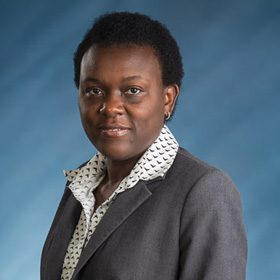
Rosemary Nabaweesi, DrPH, MPH, MBChB ,
Associate Professor, Health Policy

Karen Winkfield, MD, PhD ,
Professor, Health Policy
Head of Research & Innovation

Michael C Caldwell, MD, MPH, FACP ,
Professor of Public Health Practice, School of Global Health
Associate Vice President, Vaccine Research & Education Chief Medical Officer, Dry January USA Associate Professor, Internal Medicine, and Professional & Medical Education Meharry Medical College
Dr. Caldwell joined Meharry Medical College in August 2021. He provides leadership for health communications, vaccine research & education, as well as alcohol research, education…

Michelle D Steele, EdD ,
Associate Vice President
External Affairs
Cost per credit hour for the 2024-2025 academic year
The total cost per credit hour for the current academic year is estimated to be $1,626*.
Estimated annual tuition for 2024-2025: $29,278
Enrolled students are expected to complete a total of 18 credit hours during the first year of the program.
*This rate is subject to change on an annual basis.
Financial Aid at Meharry Medical College
Scholarships will be awarded on a merit-basis, and may include, partial, half, and full scholarship opportunities. To be considered, applicants must submit their applications no later than December 1, 2024.

Assistant Vice President of Curriculum Development and Academic Affairs,
School of Global Health,
- Biochemistry and Molecular Biology
- Biostatistics
- Environmental Health and Engineering
- Epidemiology
- Health Policy and Management
- Health, Behavior and Society
- International Health
- Mental Health
- Molecular Microbiology and Immunology
- Population, Family and Reproductive Health
- Program Finder
- Admissions Services
- Course Directory
- Academic Calendar
- Hybrid Campus
- Lecture Series
- Convocation
- Strategy and Development
- Implementation and Impact
- Integrity and Oversight
- In the School
- In the Field
- In Baltimore
- Resources for Practitioners
- Articles & News Releases
- In The News
- Statements & Announcements
- At a Glance
- Student Life
- Strategic Priorities
- Inclusion, Diversity, Anti-Racism, and Equity (IDARE)
- What is Public Health?
Doctor of Philosophy (PhD) in Health Policy and Management
Offered By: Department of Health Policy and Management
Onsite | Full-Time | 4–5 years
- MSPH Field Placements
- Master's Essays
- MAS Application Fee Waiver Requirements
- Master of Arts and Master of Science in Public Health (MA/MSPH)
- Master of Arts in Public Health Biology (MAPHB)
- Master of Bioethics (MBE)
- Mission, Vision, and Values
- Student Experience
- Program Outcomes
- For Hopkins Undergraduate Students
- Master of Health Science (MHS) - Department of Biochemistry and Molecular Biology
- Master of Health Science (MHS) - Department of Epidemiology
- Alumni Update
- MHS Combined with a Certificate Program
- Master of Health Science (MHS) - Department of Molecular Microbiology and Immunology
- Bachelor's/MHS in Health Economics and Outcomes Research
- MHS HEOR Careers
- Frequently Asked Questions
- Master of Health Science (MHS)
- Concurrent School-Wide Master of Health Science Program in Biostatistics
- Master of Health Science - Department of Population, Family and Reproductive Health
- Master of Health Science Online (MHS) - Department of Population, Family and Reproductive Health
- Careers in Health Economics
- Core Competencies
- Meet the Director
- What is Health Economics
- MPH Capstone Schedule
- Concentrations
- Online/Part-Time Format
- Requirements
Tuition and Funding
- Executive Board Faculty
- Master of Science (ScM) - Department of Biochemistry and Molecular Biology
- Master of Science (ScM) - Department of Biostatistics
- Master of Science (ScM) - Department of Epidemiology
- Master of Science (ScM) - Department of Molecular Microbiology and Immunology
- Bachelor's/MSPH in Health Policy
- FAQ for MSPH in Health Policy
- Field Placement Experience
- MSPH Capstone
- MSPH Practicum
- Required and Elective Courses
- Student Timeline
- Career Opportunities
- 38-Week Dietetics Practicum
- Completion Requirements
- MSPH/RD Program FAQ
- Program Goals
- Application Fee Waiver Requirements
- Doctor of Philosophy (PhD) - Department of Biostatistics
- Doctor of Philosophy (PhD) - Department of Epidemiology
- Program Goals and Expectations
- Doctor of Philosophy (PhD) - Department of Molecular Microbiology and Immunology
- Doctor of Philosophy (PhD) - Department of Population, Family and Reproductive Health
- Doctor of Philosophy (PhD) in Clinical Investigation
- Recent Graduates and Dissertation Titles
- PhD Funding
- PhD TA Requirement
- Recent Dissertation Titles
- JHU-Tsinghua Doctor of Public Health
- Prerequisites
- Concentration in Women’s and Reproductive Health
- Custom Track
- Concentration in Environmental Health
- Concentration in Global Health: Policy and Evaluation
- Concentration in Health Equity and Social Justice
- Concentration in Health Policy and Management
- Concentration in Implementation Science
- Combined Bachelor's / Master's Programs
- Concurrent MHS Option for BSPH Doctoral Students
- Concurrent MSPH Option for JHSPH Doctoral students
- Doctor of Medicine and Doctor of Philosophy (MD/PhD)
- Adolescent Health Certificate Program
- Bioethics Certificate Program
- Clinical Trials Certificate Program
- Community- Based Public Health Certificate Program
- Demographic Methods Certificate Program
- Epidemiology for Public Health Professionals Certificate Program
- Evaluation: International Health Programs Certificate Program
- Frequently Asked Questions for Certificate Programs
- Gender and Health Certificate Program
- Gerontology Certificate Program
- Global Digital Health Certificate Program
- Global Health Certificate Program
- Global Health Practice Certificate Program
- Health Communication Certificate Program
- Health Disparities and Health Inequality Certificate Program
- Health Education Certificate Program
- Health Finance and Management Certificate Program
- Health and Human Rights Certificate Program
- Healthcare Epidemiology and Infection Prevention and Control Certificate Program
- Humanitarian Health Certificate Program
- Implementation Science and Research Practice Certificate Program
- Injury and Violence Prevention Certificate Program
- International Healthcare Management and Leadership Certificate Program
- Leadership for Public Health and Healthcare Certificate Program
- Lesbian, Gay, Bisexual, Transgender, and Queer (LGBTQ) Public Health Certificate Program
- Maternal and Child Health Certificate Program
- Mental Health Policy, Economics and Services Certificate Program
- Non-Degree Students General Admissions Info
- Pharmacoepidemiology and Drug Safety Certificate Program
- Population Health Management Certificate Program
- Population and Health Certificate Program
- Public Health Advocacy Certificate Program
- Public Health Economics Certificate Program
- Public Health Informatics Certificate Program
- Public Health Practice Certificate Program
- Public Health Training Certificate for American Indian Health Professionals
- Public Mental Health Research Certificate Program
- Quality, Patient Safety and Outcomes Research Certificate Program
- Quantitative Methods in Public Health Certificate Program
- Requirements for Successful Completion of a Certificate Program
- Rigor, Reproducibility, and Responsibility in Scientific Practice Certificate Program
- Risk Sciences and Public Policy Certificate Program
- Spatial Analysis for Public Health Certificate Program
- Training Certificate in Public Health
- Tropical Medicine Certificate Program
- Tuition for Certificate Programs
- Vaccine Science and Policy Certificate Program
- Online Student Experience
- MAS and Affiliated Certificate Programs
- Barcelona Information
- Registration, Tuition, and Fees
- Agency Scholarship Application
- General Scholarship Application
- UPF Scholarship Application
- Course Evaluations
- Online Courses
- Registration
- General Institute Tuition Information
- International Students
- Directions to the Bloomberg School
- All Courses
- Important Guidance for ONSITE Students
- D.C. Courses
- Registration and Fees
- Cancellation and Closure Policies
- Application Procedures
- Career Search
- Current Activities
- Current Trainees
- Related Links
- Process for Appointing Postdoctoral Fellows
- Message from the Director
- Program Details
- Admissions FAQ
- Current Residents
- Elective Opportunities for Visiting Trainees
- What is Occupational and Environmental Medicine?
- Admissions Info
- Graduates by Year
- Compensation and Benefits
- How to Apply
- Academic Committee
- Course Details and Registration
- Tuition and Fees
- ONLINE SOCI PROGRAM
- Principal Faculty
- General Application
- JHHS Application
- Our Faculty
- Descripción los Cursos
- Programa en Epidemiología para Gestores de Salud, Basado en Internet
- Consultants
- Britt Dahlberg, PhD
- Joke Bradt, PhD, MT-BC
- Mark R. Luborsky, PhD
- Marsha Wittink, PhD
- Rebekka Lee, ScD
- Su Yeon Lee-Tauler, PhD
- Theresa Hoeft, PhD
- Vicki L. Plano Clark, PhD
- Program Retreat
- Mixed Methods Applications: Illustrations
- Announcements
- 2023 Call for Applications
- Jennifer I Manuel, PhD, MSW
- Joke Bradt, PhD
- Josiemer Mattei, PhD, MPH
- Justin Sanders, MD, MSc
- Linda Charmaran, PhD
- Nao Hagiwara, PhD
- Nynikka R. A. Palmer, DrPH, MPH
- Olayinka O. Shiyanbola, BPharm, PhD
- Sarah Ronis, MD, MPH
- Susan D. Brown, PhD
- Tara Lagu, MD, MPH
- Theresa Hoft, PhD
- Wynne E. Norton, PhD
- Yvonne Mensa-Wilmot, PhD, MPH
- A. Susana Ramírez, PhD, MPH
- Animesh Sabnis, MD, MSHS
- Autumn Kieber-Emmons, MD, MPH
- Benjamin Han, MD, MPH
- Brooke A. Levandowski, PhD, MPA
- Camille R. Quinn, PhD, AM, LCSW
- Justine Wu, MD, MPH
- Kelly Aschbrenner, PhD
- Kim N. Danforth, ScD, MPH
- Loreto Leiva, PhD
- Marie Brault, PhD
- Mary E. Cooley, PhD, RN, FAAN
- Meganne K. Masko, PhD, MT-BC/L
- PhuongThao D. Le, PhD, MPH
- Rebecca Lobb, ScD, MPH
- Allegra R. Gordon, ScD MPH
- Anita Misra-Hebert, MD MPH FACP
- Arden M. Morris, MD, MPH
- Caroline Silva, PhD
- Danielle Davidov, PhD
- Hans Oh, PhD
- J. Nicholas Dionne-Odom, PhD RN ACHPN
- Jacqueline Mogle, PhD
- Jammie Hopkins, DrPH, MS
- Joe Glass, PhD MSW
- Karen Whiteman, PhD MSW
- Katie Schultz, PhD MSW
- Rose Molina, MD
- Uriyoán Colón-Ramos, ScD MPA
- Andrew Riley, PhD
- Byron J. Powell, PhD, LCSW
- Carrie Nieman MD, MPH
- Charles R. Rogers, PhD, MPH, MS, CHES®
- Emily E. Haroz, PhD
- Jennifer Tsui, Ph.D., M.P.H.
- Jessica Magidson, PhD
- Katherine Sanchez, PhD, LCSW
- Kelly Doran, MD, MHS
- Kiara Alvarez, PhD
- LaPrincess C. Brewer, MD, MPH
- Melissa Radey, PhD, MA, MSSW
- Sophia L. Johnson, PharmD, MPH, PhD
- Supriya Gupta Mohile, MD, MS
- Virginia McKay, PhD
- Andrew Cohen, MD, PhD
- Angela Chen, PhD, PMHNP-BC, RN
- Christopher Salas-Wright, PhD, MSW
- Eliza Park MD, MS
- Jaime M. Hughes, PhD, MPH, MSW
- Johanne Eliacin, PhD, HSPP
- Lingrui Liu ScD MS
- Meaghan Kennedy, MD
- Nicole Stadnick, PhD, MPH
- Paula Aristizabal, MD
- Radhika Sundararajan, MD
- Sara Mamo, AuD, PhD
- Tullika Garg, MD MPH FACS
- Allison Magnuson, DO
- Ariel Williamson PhD, DBSM
- Benita Bamgbade, PharmD, PhD
- Christopher Woodrell MD
- Hung-Jui (Ray) Tan, MD, MSHPM
- Jasmine Abrams, PhD
- Jose Alejandro Rauh-Hain, MD
- Karen Flórez, DrPH, MPH
- Lavanya Vasudevan, PhD, MPH, CPH
- Maria Garcia, MD, MPH
- Robert Brady, PhD
- Saria Hassan, MD
- Scherezade Mama, DrPH
- Yuan Lu, ScD
- 2021 Scholars
- Sign Up for Our Email List
- Workforce Training
- Cells-to-Society Courses
- Course/Section Numbers Explained
- Pathway Program with Goucher College
- The George G. Graham Lecture
About the PhD in Health Policy and Management Program
The PhD in Health Policy and Management is a full-time doctoral program that trains its students to conduct original investigator-initiated research through a combination of coursework and research mentoring. The curriculum includes core coursework that is common across the four concentrations and courses specific to each individual concentration. Applicants to the PhD in Health Policy and Management apply directly to one of four concentrations. All four options have the same deadline, structure, and funding.
Concentration Areas
This concentration is designed for students interested in conducting independent research on ethical issues in public health policy, research and practice such as domestic and international research ethics, learning health systems, emerging biomedical technologies, ethics and public health genetics, national and global food policy, access to care and health care priority setting. By the end of their training, students are equipped to function as independent researchers, conducting empirical research related to bioethics, public health and health policy, as well as prepared to provide practical and normative recommendations regarding ethics and public health policy.
View more program information about the Concentration in Bioethics and Health Policy.
This concentration is designed for students interested in preventing leading public health problems through the development, analysis, implementation and evaluation of public health policies. Students affiliated with this concentration employ an interdisciplinary approach to their research in areas such as environmental and occupational health policy, injury prevention and control, social policy, and health and the practice of prevention.
View more program information about the Concentration in Health and Public Policy .
This concentration prepares doctoral students for conducting innovative and rigorous research on the economics of health and healthcare. The curriculum stresses a solid grounding in applied modern microeconomic theory, quantitative methods, and econometrics applications. Students take courses through the Department of Economics in the Krieger School of Arts and Sciences.
View more program information about the Concentration in Health Economics and Policy.
This concentration prepares doctoral students for conducting innovative and rigorous quantitative and qualitative research and evaluation in health services delivery. The curriculum includes exposure to a wide variety of research methods, content areas, and datasets. It also offers the opportunity for in-depth study in areas such as public health informatics, quality of care and patient-centered outcomes research, including a focus on older adults, and health care disparities.
View more program information about the Concentration in Health Services Research and Policy.
Curriculum for the PhD in Health Policy and Management
Browse an overview of the requirements for this PhD program in the JHU Academic Catalogue and explore all course offerings in the Bloomberg School Course Directory .
What Can You Do With a Graduate Degree In Health Policy And Management?
Our graduates graduates pursue research careers in top-tier universities, research and policy-making organizations, the health care industry and government agencies. Visit the Graduate Employment Outcomes Dashboard to learn about Bloomberg School graduates' employment status, sector, and salaries.
Admissions Requirements
For general admissions requirements, please visit the How to Apply page. All concentrations follow the same admission process. Please see below for full details on the scope of each concentration.
PhD in Health Policy and Management – Bioethics and Health Policy
PhD in Health Policy and Management – Health and Public Policy
PhD in Health Policy and Management – Health Economics and Policy
PhD in Health Policy and Management – Health Services Research and Policy
For general information regarding tuition and fees, visit the Bloomberg School’s Tuition and Fees page.
Per the Collective Bargaining Agreement (CBA) with the JHU PhD Union, the minimum guaranteed 2025-2026 academic year stipend is $50,000 for all PhD students with a 4% increase the following year. Tuition, fees, and medical benefits are provided, including health insurance premiums for PhD student’s children and spouses of international students, depending on visa type. The minimum stipend and tuition coverage is guaranteed for at least the first four years of a BSPH PhD program; specific amounts and the number of years supported, as well as work expectations related to that stipend will vary across departments and funding source. Please refer to the CBA to review specific benefits, compensation, and other terms.
Need-Based Relocation Grants Students who are admitted to PhD programs at JHU starting in Fall 2023 or beyond can apply to receive a need-based grant to offset the costs of relocating to be able to attend JHU. These grants provide funding to a portion of incoming students who, without this money, may otherwise not be able to afford to relocate to JHU for their PhD program. This is not a merit-based grant. Applications will be evaluated solely based on financial need. View more information about the need-based relocation grants for PhD students .
Questions about the program? We're happy to help. [email protected]

Health Law and Policy
Over one dollar in six in the US economy is spent on health care, and the need for wise public and organizational policy decisions to control costs, to improve quality, and to increase access has never been greater. In the public health arena, the nation confronts a rising tide of noncommunicable disease, resurgent threats of infectious disease, and other problems that will demand legal and policy interventions. Stanford Law School is second to none as a training ground for tomorrow’s leaders in health law and policy. Four renowned Law School faculty members offer courses in health care law, public health law, and bioethics and advise students interested in careers in the field. Courses in mental health law, food and drug law, mass tort litigation, environmental law, policy analysis skills, and other critical areas help expand students’ intellectual toolkit. Joint degree programs with the Stanford University School of Medicine, the ability to cross-register for health-related courses taught in other Stanford professional schools and departments, and research opportunities through Stanford’s health-focused research institutes round out the experience.
Faculty on Point

Core Health Law Faculty

Henry T. Greely
- Deane F. and Kate Edelman Johnson Professor of Law
- Director, Center for Law and the Biosciences
- Professor, by courtesy, Genetics
- Chair, Steering Committee of the Center for Biomedical Ethics
- Director, Stanford Program in Neuroscience and Society

Daniel P. Kessler
- Professor of Law
- Keith and Jan Hurlbut Senior Fellow, Hoover Institution
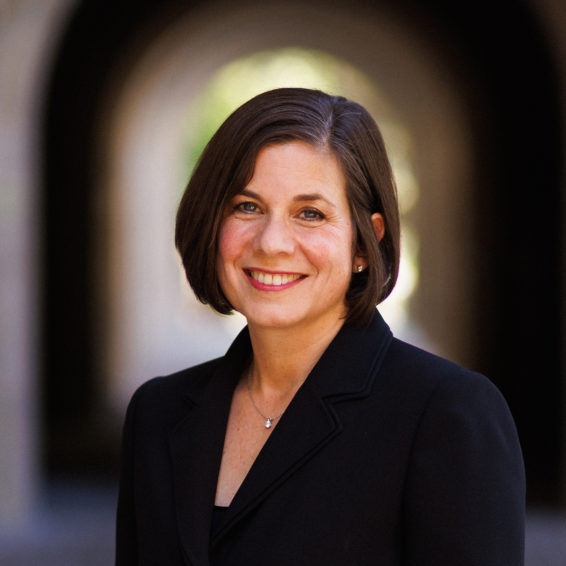
Michelle M. Mello
- Professor of Health Policy

David M. Studdert
- Vice Provost and Dean of Research
More Teaching and Advising Faculty

Mariano-Florentino Cuéllar
- Visiting Scholar
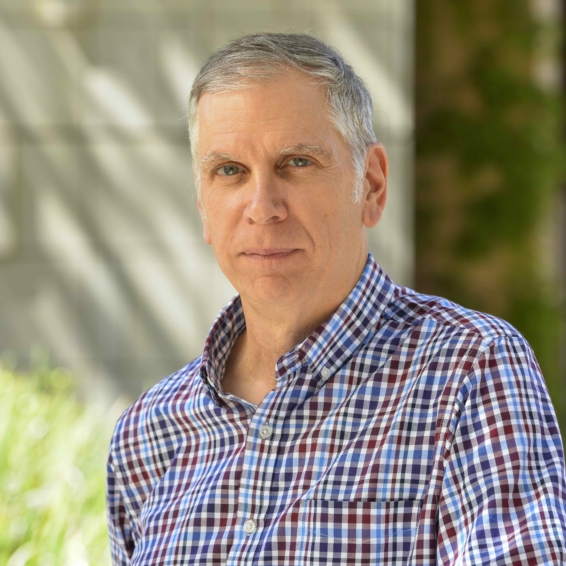
John J. Donohue III
- C. Wendell and Edith M. Carlsmith Professor of Law

Nora Freeman Engstrom
- Ernest W. McFarland Professor of Law
- Co-Director, Deborah L. Rhode Center on the Legal Profession

Deborah Hensler
- Judge John W. Ford Professor of Dispute Resolution
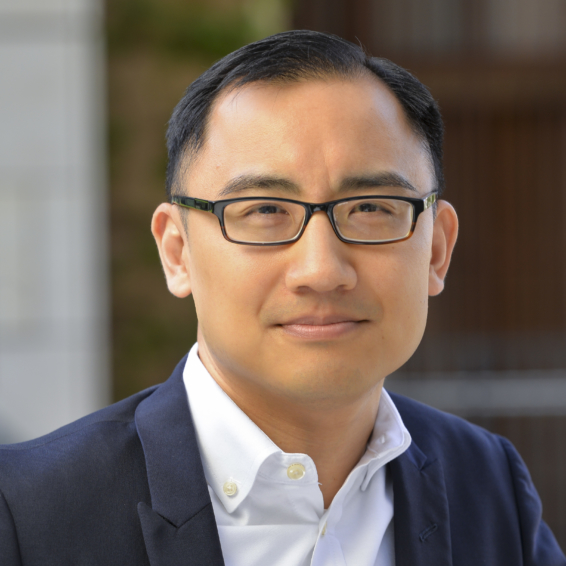
Daniel E. Ho
- William Benjamin Scott and Luna M. Scott Professor of Law
- Professor of Political Science
- Professor of Computer Science (by courtesy)
- Senior Fellow, Stanford Institute for Human-Centered Artificial Intelligence (HAI)
- Senior Fellow, Stanford Institute for Economic and Policy Research
- Director of the Regulation, Evaluation, and Governance Lab (RegLab)

Robert J. MacCoun
- James and Patricia Kowal Professor of Law
- Senior Fellow at the Freeman Spogli Institute for International Studies

Lisa Larrimore Ouellette
- Deane F. Johnson Professor of Law
- Senior Fellow, Stanford Institute for Economic Policy Research (SIEPR)

Robert L. Rabin
- A. Calder Mackay Professor of Law
Faculty Research Projects

Hank Greely has been publishing widely on the issues raised by human germline genome editing and He Jiankui’s “CRISPR’d babies.” Hank Greely has worked on various issues around “human brain surrogates,” from human/non-human brain chimeras, to human neural organoids, to partial or whole human brains kept “alive” outside the body. Hank Greely is writing a book called “Playing With Life” about who advances in the biosciences are, in effect, letting humans change living organisms in ways and to extents never before imagined…and exploring what kind of world(s) we may end up with.

Daniel Kessler is investigating how choice of organizational form by physicians (for example, solo versus group practice), and integration between physicians and hospitals, affect competition and the cost and quality of care. Daniel Kessler is studying how different types of prescription drug insurance affect opioid prescribing behavior by physicians.
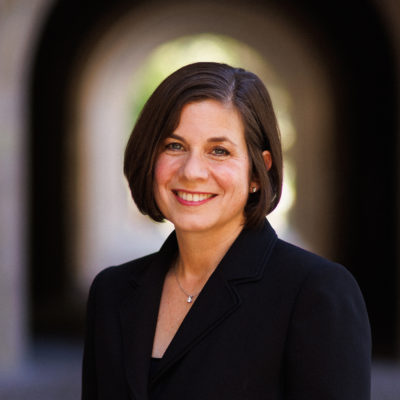
Michelle Mello is exploring approaches to governing health care artificial intelligence and regulating high-priced prescription drugs, issues in vaccination policy, and lessons learned about emergency health powers laws during COVID-19. Michelle Mello and David Studdert are studying how governance of data transfers between universities and external organizations for research purposes could be improved.

David Studdert is leading a study examining the relationship between firearm ownership and risks of mortality among residents of California. David Studdert is conducting an international study assessing the role of traffic laws and their enforcement in preventing road accidents. David Studdert and Michelle Mello are investigating how the experience of being sued changes the way physicians deliver care.
Research Programs and Centers
Linkages between SLS and health-focused research centers around Stanford University make for rich environment for research on health law and policy. These centers include:
Publications
Understanding liability risk from using health care artificial intelligence tools, new eng. j. med..
Author(s): Michelle M. Mello , Neel Guha
The authors review challenges arising in malpractice litigation related to software errors to inform health care organizations and physicians about liability risk from AI adoption and about strategies to mitigate risk.
Public Health Law Modernization 2.0: Rebalancing Public Health Powers And Individual Liberty In The Age Of COVID-19
Health Affairs
Author(s): Michelle M. Mello , Lawrence O. Gostin
Governing Emerging Technologies—Looking Forward with Horizon Scanning and Looking Back with Technology Audits
Global Public Policy and Governance
Author(s): Henry T. Greely
The 14-Day Embryo Rule: A Modest Proposal
The Death of Roe and the Future of Ex Vivo Embryos
Journal of Law and the Biosciences
Frankenstein and Modern Bioscience: Which Story Should We Heed?
Huntington Library Quarterly (forthcoming 2021)
CRISPR People: The Science and Ethics of Editing Humans
Experiential Learning
SLS offers opportunities for students interested in health to pursue structured experiential learning through:

Juelsgaard Intellectual Property and Innovation Clinic
Occasional Law and Policy Labs offering students a practicum experience in partnership with health policy makers. Recent Policy Labs have included:

This policy lab maps the law school experience for students with psychiatric or mental health disabilities. It identifies barriers for…

Clients: California Native American Tribes, prescribed burn associations, federal legislative and executive branch decision makers. Wildfire has emerged as one…

This policy lab will build on the work of the Fall 2022 policy lab that researched three specific issues related…
Student Organizations
Student journals, joint degree programs.
- JD/MS in Health Policy (focus in Health Services Research or Epidemiology)
- JD/MD in Law and Medicine
- JD/PhD in Law and Psychology
- JD/PhD in Health Policy
- JD/MS in Epidemiology and Clinical Research
- JD/PhD in Epidemiology and Clinical Research
Center for Law and the Biosciences Welcome Reception
- September 10, 2024 @ 4:30pm
- Location: Room offsite
Inside Stanford Lawyer Magazine
Mello awarded md article prize, goldin receives research award.

Professor Hank Greely on NPR: Scientists Create Immature Human Eggs From Stem Cells
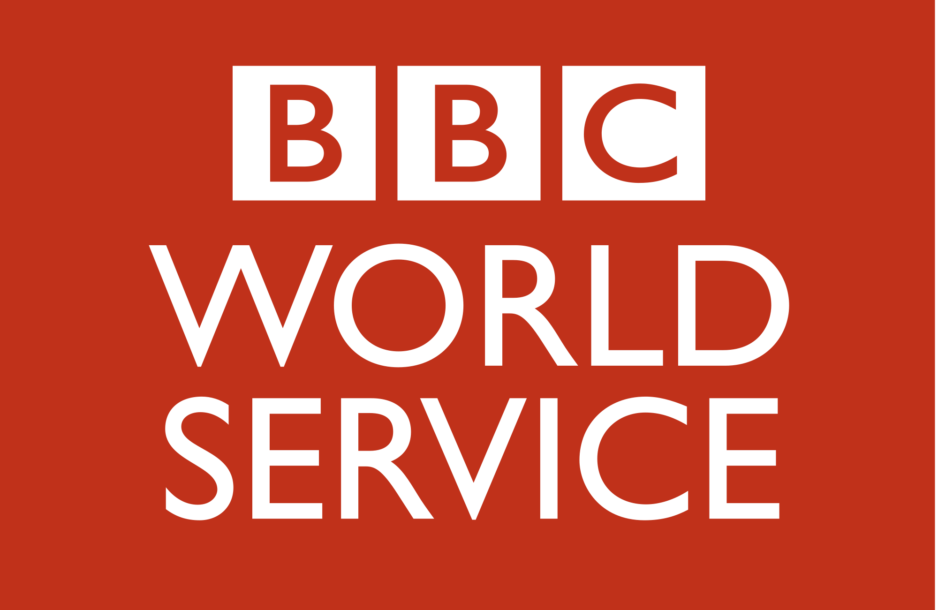
Professor Hank Greely on BBC World Service: The Changing Face of Procreation
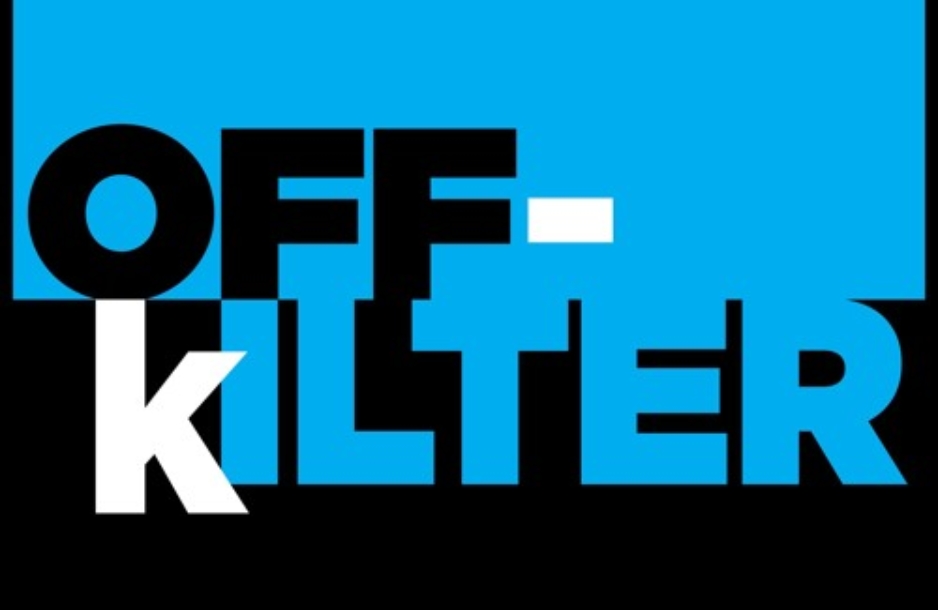
Professor Rabia Belt on Off-Kilter

Ana-Mita Betancourt: Navigating Risk for the World’s Underserved
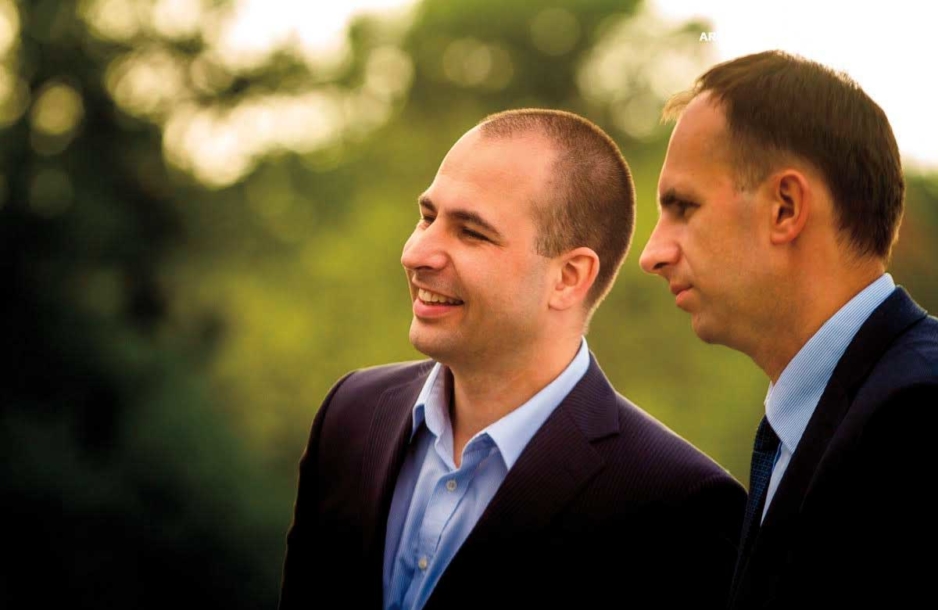
Bright Award for Environmental Sustainability

Law and Wellness

Reforming the Civil Justice System? First, Do No Harm

Veterans Treatment Courts Practicum

Health and Law

SLS to Advance “Neurolaw” as Part of $10 Million Grant

Quentin Cook Named Mormon Apostle
Health Law and Policy Program
UCLA’s Health Law and Policy Program brings together experts across disciplines to identify legal pathways for innovative and practical health reforms that rise to critical challenges.
Shaping the Future of Health Law
UCLA faculty are shaping the future of this dynamic and critically important field. Through publications, convenings, and advice to government and industry leaders, they articulate the legal powers, duties, and constraints that apply to government action on health care, public health, and the social determinants of health.
The need for innovative and practical health reform solutions has never been greater—nor has the complexity of the legal landscape reforms must navigate. With a growing cadre of prominent health law and policy faculty and established centers of excellence in related fields, UCLA is uniquely positioned to be a national leader in this dynamic and rapidly expanding field. The Health Law and Policy Program fosters cross-disciplinary partnerships within UCLA and beyond to develop federal, state, local, and global solutions for rebuilding our broken health system, securing access to health care, protecting the public’s health, and realizing health justice. The Health Law and Policy Program also serves as a hub for JD, LLM, MLS, and other UCLA graduate students pursuing careers in health law and policy.
Lindsay Wiley
Diana r. h. winters, jill r. horwitz, russell korobkin, taimie l. bryant, jeanne nishimoto, sunita patel, robert bradley sears, anil shankar, lara stemple, sanford s. williams, speaker series.
This series focuses on different aspects of psychedelics, including their uses, how they change people’s lives, and their legal regulation.
If you have questions, please contact Professor Taimie Bryant: [email protected] .
April 22, 2024 , 5 pm to 6:30 pm IN PERSON
Dr. Katherine MacLean, neuroscientist, speaking about her memoir, “Midnight Water.”
Legalizing the Magic of Mushrooms
November 13, 2023
View the recording of the program .
Legal rules regulating access to psychedelics are evolving in concert with recognition of the remarkable potential of psychedelics to heal various psychological and physical conditions. The UCLA Health Law and Policy Program invites you to a Zoom webinar featuring Professor Mason Marks. Professor Marks, a medical doctor and lawyer, leads the Project on Psychedelics Law and Regulation at Harvard Law School. He will speak about his forthcoming book on trends in state and federal regulation of psychedelics and provide up-to-date information about the status of laws in different jurisdictions.

February 7, 2024
Kathryn Tucker, Esq., speaking about advocacy efforts to improve access to psychedelics for medical purposes.
Legal rules regulating access to psychedelics are evolving in concert with the recognition of the remarkable potential of psychedelics to heal various psychological and physical conditions.
Ms. Tucker is a pathbreaking litigator involved in seeking legal access to synthetic psilocybin. She is Director of Advocacy for the National Psychedelics Association and a founding board member of the Psychedelic Bar Association.
March 4, 2024
Multi-Site Study on Palliative Effects of Psylocibin
View the recording of this program .
UCLA Law Professor Taimie Bryant continues the speaker series on psychedelics with a presentation from Dr. Charles Grob who spoke about a new multi-site study underway to learn more about the use of psilocybin as part of palliative care. In 2011, Dr. Grob published research suggesting that a single large dose of the hallucinogen psilocybin could reduce existential anguish and demoralization some people experience when approaching the end of their lives. Subsequent research validated those findings. Dr. Grob will be talking about the research design and hypotheses associated with a new multi-site research study to learn more about the circumstances under which most people can benefit from this treatment.
The Health Justice Initiative brings together scholars, advocates, and policymakers to develop, disseminate, and implement innovative strategies for securing justice, valuing human dignity, and empowering communities to address the structural and social determinants of health.
More information
The Future of Human Rights and Justice-Centered Ethics in Epidemic Response Initiative brings together researchers, community organization leaders, and current and former health officials to discuss legal and governance mechanisms for ensuring that measures adopted to mitigate the impacts of epidemics are consistent with human rights and justice-centered public health ethics.
Mainstreaming Reproductive Health
UCLA’s Health Law and Policy Program is collaborating with UCLA’s Center on Reproductive Health, Law, and Policy on research and programming that explores opportunities for incorporating efforts to secure access to reproductive health care within broader health care reforms relating to scope of practice, health care financing and reimbursement, informed consent, and more.
To celebrate the publication of Feminist Judgments: Health Law Rewritten , edited by Seema Mohapatra and Lindsay F. Wiley, UCLA School of Law hosted an in-person conference on “Mainstreaming Reproductive Health in Health Law, Policy and Ethics” on February 10, 2023.
UCLA Law Professor Jill Horwitz is a leading authority on issues at the intersection of health care and nonprofit law.
On April 21, 2023 she will moderate a discussion on the role of the general counsel for nonprofit hospitals featuring three leading general counsel from different types of large nonprofit hospitals, including Cedars Sinai (a multi-specialty, academic urban hospital in Los Angeles), Keck Medicine (a university-affiliated medical center), and Sharp HealthCare (a not-for-profit regional health care group located in San Diego which includes four acute care hospitals, three specialty hospitals, three affiliated medical groups, and a health plan).
This event is open to UCLA affiliates only. Please email the UCLA Student Health Law Society at [email protected] to RSVP.
Health Law and Policy
Health Care Compliance
Topics in Health Law and Policy Scholarship
Health Care Access
Issues in Drug Development and Pharmaceutical Innovation
Public Health Law
Tax-Exempt Organizations
Topics in Nonprofit Law
Administrative Law
Business Associations
Intro to Food Law and Policy
Food Litigation: Consumer Protection, Regulation, and Class Actions
Reproductive Rights and Justice
Privacy, Data & Cyber Security Law
Public Benefits Law and Anti-Poverty Policy
Veterans Justice Clinic: Poverty, Homelessness & Criminalization
Health Law Society - The mission of the Health Law Society is to raise the profile of health law issues at UCLA Law, and to provide exposure to the field and opportunities for students interested in studying and pursuing careers in health law.
Lindsay Wiley speaks with CalMatters about a Ninth Circuit ruling on a COVID vaccine mandate in L.A. public schools
Jill horwitz appears on the tradeoffs podcast to discuss free care at hospitals, lindsay wiley is quoted by stat news about litigation over medicare drug prices.
Unlock your potential in HR Management! Join us on August 27 at 1:00 pm PT via Zoom Webinar to learn more.
Methods for Policy Research
Political analysis.
Health Law and Policy Program
You are here: american university washington college of law impact initiatives programs health law and policy program.

Back to top
Your Destination for Health Law & Policy Studies in Washington, D.C.
The Health Law and Policy Program at American University Washington College of Law is a nationally recognized destination for health law, policy, drug/device, and compliance studies in Washington, DC. Our curriculum and programming connect health law and policy scholars from across the country with policymakers and practitioners in our nation’s capital. Through outreach, training, conferences, career events, and student advising, the Health Law and Policy Program also ensures that AUWCL students specializing in health law graduate practice-ready and connected to opportunities. Our students benefit from a depth of health law course offerings and opportunities that few law schools are able to match, including in health care financing and delivery, health care compliance, food and drug law, health care privacy and data security, health care fraud and abuse, medical malpractice, bioethics and regulation of human subjects research, public health law, and global health law. The Health Law and Policy Program also administers the law school's Health Care Compliance Certificate, which is accredited by the Compliance Certification Board (CCB).
More Information
Featured programs.
Health Law & Policy Program Health Care Compliance Certificate Program Providing dedicated students with the opportunity to immerse in compliance-related coursework while pursuing a JD or LL.M. degree.
Health Law & Policy Program Health Law and Policy Summer Institute The Summer Institute offers intensive courses on cutting edge topics in health law with opportunities to network with health law experts across the nation.
Health Law & Policy Program National Health Law Writing Competition Our competition is designed to encourage law students to write scholarly papers on current topics of interest relevant to health law and/or food and drug law.
Meet Our Faculty
News & events.

Asha Scielzo Appointed President of the American Health Law Association
15 Jul, 2024
The American Health Law Association (AHLA) has announced Asha Scielzo as its new Association President for the upcoming year. Scielzo officially began her term on July 1. Read More

American University Washington College Of Law Honors Graduates At 2nd Annual Commencement Awards Ceremony
17 May, 2024
Culminating years of hard work, graduating American University Washington College of Law students gathered with their families to receive awards commemorating extraordinary academic achievement. Read More
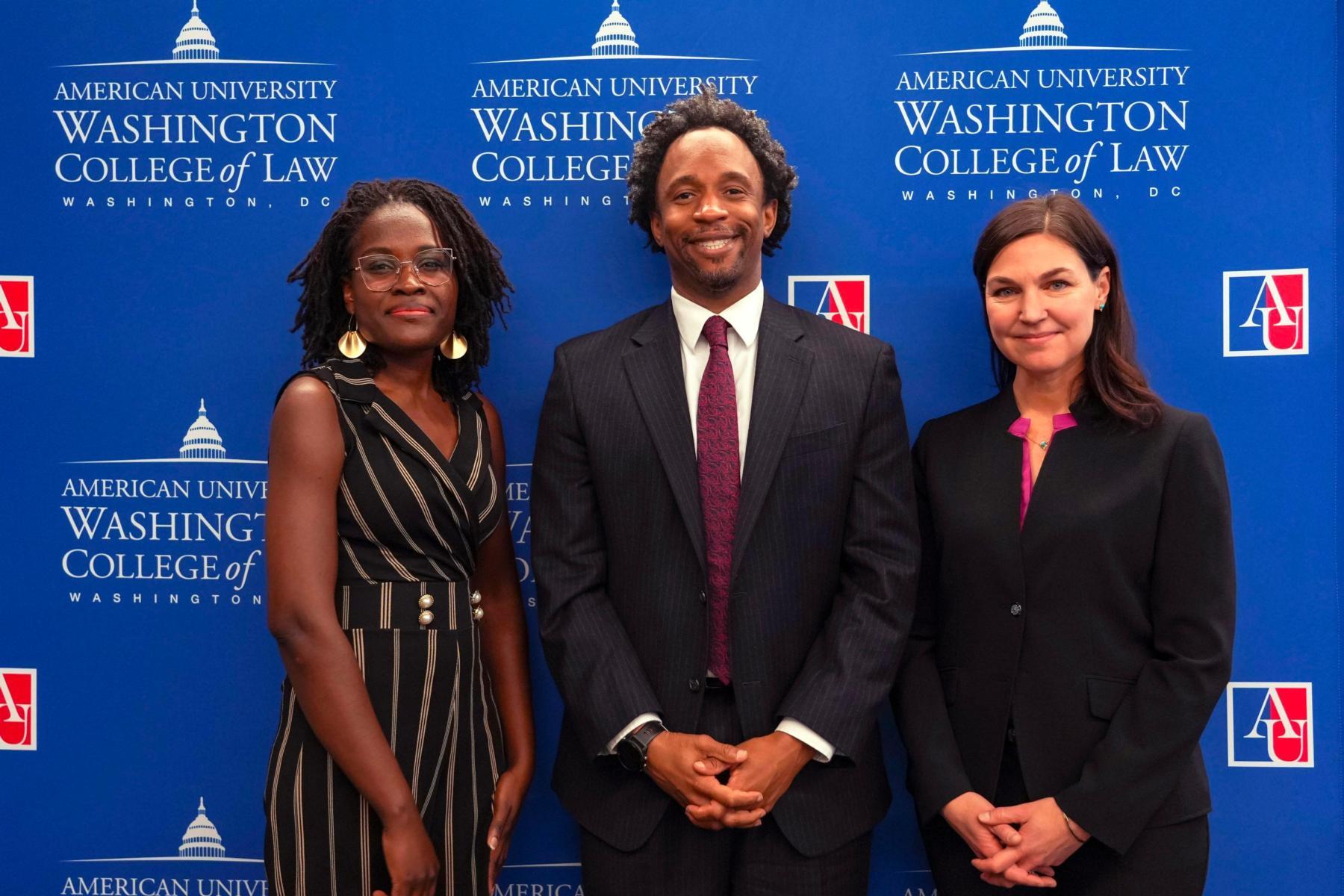
Social Determinants Of Health & Health Equity: Where We Live, What We Eat, And How We Access Care
08 Apr, 2024
The American University Washington College of Law Health Law & Policy Brief symposium brought together public health professionals and health law experts to discuss the social determinants of health, focusing on how housing, food access, and healthcare location impact health outcomes. Read More
Studying Health Law & Policy at AUWCL
AUWCL brings the practice of health law directly into the classroom, ensuring that students graduate practice-ready and connected to opportunities in the field. JD and LL.M. students also build their expertise with internships and externships in the Washington, DC area. While law students from other areas are limited to summers or a single semester in DC, AUWCL students hone their skills and build their resumes year-round at local, state, federal, and international health agencies and organizations.
Pursue an LL.M. Degree with a Health Law Specialization
The Specialization is a rigorous program designed to prepare lawyers for successful careers in the dynamic field of health law.
Boston University Academics
Boston University
- Campus Life
- Schools & Colleges
- Degree Programs
- Search Academics
PhD in Health Services & Policy Research
For contact information, please visit the School of Public Health website .
The Doctor of Philosophy in Health Services & Policy Research (PhD) degree program offered by the Department of Health Law, Policy & Management is designed to provide individuals with excellent research skills for use in academic, industry, or government settings. Students have the opportunity to collaborate with senior faculty in innovative research crucial to the improvement of healthcare delivery, treatment outcomes, and government policies. Graduates are known for their excellent methodological skills and substantive knowledge of healthcare settings and policies, competencies that enable students to translate research findings into practical applications.
The doctoral program supports a focus on quantitative methods and qualitative methods, while fostering facility with mixed methods designs.
Learning Outcomes
Upon completion of the PhD in Health Services & Policy Research (HSPR), the graduate is able to:
- Analyze key factors that have the potential to influence health and provision and use of health services. These may include policy, organization, and financing of healthcare services. They may also include social, economic, cultural, political, and biological factors that influence population health, health equity, and the use of services.
- Critique, adapt, and develop theoretical analyses of health services and policies, including explanations of their structures and processes, the use of health services, the effectiveness and implementation of health policies, and the effects of health services and policies on individual and population health and health equity. This may be done by drawing upon the foundational fields of sociology, economics, anthropology, political science, psychology, demography, epidemiology, management, and/or organizational science.
- Develop original, relevant, and important research questions to pursue in HSPR that are grounded in both a critical analysis of prior HSPR literature and relevant theoretical perspectives.
- Identify and analyze the strengths and weaknesses of a variety of possible study designs that can appropriately address specific HSPR questions. Appropriate methods may employ experimental or observational approaches, qualitative or quantitative analytic techniques, and a variety of data types.
- Based on relevant theory and selected research question(s), develop an HSPR design, specifying study constructs, research objectives, hypotheses, and methods that reliably and validly measure outcomes of interest. Select optimal analytical approaches, in combination as necessary, to investigate hypotheses.
- Acquire and manage appropriate data to answer HSPR questions. Collect and manage primary health and healthcare utilization data and/or assemble and manage existing data from public and private data sources in accordance with an original research design.
- Apply appropriate analytical techniques to data in order to investigate HSPR questions. Utilize appropriate combinations of analytic techniques to enrich data analysis and interpretation.
- Develop, document, and employ procedures that ensure the reproducibility of the science, the responsible use of resources, mutual accountability with collaborators, and the ethical treatment of research subjects.
- Effectively communicate the process, findings, and implications of HSPR using multiple modes, including via peer-reviewed publications, oral presentations, and electronic media. Translate findings to multiple stakeholders and audiences including funders, research participants, colleagues, policymakers, news media, and managers.
Program Requirements
The doctoral program includes the coursework requirements outlined below, which typically total at least 42 units. Students with an earned master’s degree may take fewer courses, if course waivers are granted based on previous relevant graduate coursework. However, in all cases, students are required to take no fewer than 32 units of PhD coursework in residence at Boston University post-matriculation into the PhD program. A minimum grade of a B is required in all PhD coursework.
Foundations of Public Health
Effective public health requires expertise from many disciplines, and students need to have a broad foundation of knowledge across these diverse disciplines in order to collaborate effectively with other health professionals.
SPH PH 700 Foundations of Public Health (0 units) is an online course designed to provide students with foundational knowledge in the profession and science of public health and factors related to public health. PH 700 meets the foundational knowledge criteria (as outlined by CEPH) for all SPH students.
Core PhD Courses
- SPH PH 842 Research Theory and Design (2 units)
- SPH PH 843 Quantitative Methods for Health and Social Policy Research (2 units)
- SPH PH 844 Introduction to Qualitative Methods for Health and Social Policy Research (2 units)
- SPH PM 820 Introduction to Quality Measurement and Evaluation (2 units)
- SPH PM 822 Advanced Quantitative Methods for Health and Social Policy Research (4 units)
- SPH PM 828 Advanced Qualitative Methods (4 units)
- SPH PM 842 Health Economics for Health and Social Policy Research or equivalent (4 units)
- SPH PM 846 Advanced Quantitative Policy and Program Implementation and Evaluation (4 units)
- SPH PM 864 Contemporary Structures of Health Services (2 units)
- SPH PM 866 Theory in the Analysis of Health Services (2 units)
Additional Course Requirements
- Healthcare Policy
- Implementation Science/Organizational Change
- Quality/Outcomes
Students are required to complete all the requirements for graduation within seven years of matriculation. PhD students are required to successfully complete the qualifying process, and complete and orally defend a dissertation.
Students who have completed the PhD coursework must register for SPH PM 980 Continuing Study each fall and spring term until the dissertation is defended and accepted. PM 980 is ungraded and 0 units; it allows a student to be certified as full time and carries the equivalent of a 2-unit tuition charge plus the fee for student health insurance (unless waived). Students must adhere to dissertation submission deadlines and requirements.
All PhD students must adhere to the Doctoral Graduation Calendar in preparing and submitting the dissertation.
All SPH students will need a laptop or tablet for classes, purchased according to the recommendations of the Medical Campus Information Technology professionals.
Related Bulletin Pages
- Abbreviations and Symbols
Beyond the Bulletin
- School of Public Health
- SPH Admissions
- SPH Academic Calendar
- Master of Public Health
- Health Equity
- Dual Degree Programs
- Business Administration & Public Health
- Genetic Counseling & Public Health MS/MPH
- Medical Sciences & Public Health MS/MPH
- Medicine & Public Health MD/MPH
- Social Work & Public Health MSW/MPH
- Doctor of Public Health in Leadership, Management & Policy
- Applied Biostatistics
- Biostatistics
- Climate and Health
- Environmental Health
- Epidemiology
- Global Health Research
- Health Services & Policy Research
- Population Health Research
- Public Health Data Science
- Translation and Implementation Science
- Boston Consortium
- Departments
Terms of Use
Note that this information may change at any time. Read the full terms of use .
related websites
Accreditation.
Boston University is accredited by the New England Commission of Higher Education (NECHE).

- © Copyright
- Mobile Version
Doctor of Philosophy in Health Policy and Management
UCLA Fielding School of Public Health
The PhD in Health Policy and Management is an academic degree emphasizing the in-depth expertise necessary for a research career. It emphasizes the integration of theory and research in a focused substantive area (cognate). This includes classroom instruction; non-credit seminars; independent study; research projects; academic apprenticeships; and interaction with faculty, fellow students, and other professionals within and outside the UCLA campus.
Because each student has unique and specific interests, doctoral training is individualized to the needs and interests of the particular student.
The doctoral program encompasses the following major elements and stages:
- Course work in the major and cognate/minor fields
- Written qualifying examination
- Proposal for the dissertation
- Oral qualifying examination on the proposal for the dissertation (advancement to candidacy)
Dissertation
- Oral defense of the dissertation
Course Work
Students must have a minimum of 17 courses (70 units). All students are required to specialize in a particular area of study, a cognate, which requires additional coursework. Of these, 11-12 courses (46-50 units) are required, five courses (20 units) are electives, and remaining units may be fulfilled with additional electives or from the cognate coursework.
Required Courses (11-12 courses/44-50 units)
- HLT POL 200A: Health Systems Organization and Financing, I
- HLT POL 226A: Readings in Health Service Research (2 Units)
- HLT POL 226B: Readings in Health Service Research (2 Units)
- HLT POL 227B: Special Topics in Health Services
- HLT POL 225A: Health Services Research Design (6 Units)
- HLT POL 225B: Health Services Research Design (6 Units)
- HLT POL 423 Practices of Evaluation in Health Services
- HLT POL 237C: Health Services Research Methodology (6 Units)
- BIOSTATS 201A: Applied Regression
- BIOSTATS 201B: Applied Regression
- EPIDEM 100 or an equivalent introductory survey course or show proof of an equivalent graduate-level introductory epidemiology course that meets the requirements for an MPH, MS, PhD, or MD program
- One (or more) additional statistics course (200-level or above) ONLY this additional statistics course may be taken on a Pass/No Pass basis. All other courses MUST be graded.
Elective Courses (5 courses/20 units)
- Students select four or more elective courses
Cognate Requirements
Cognate studies give students a depth of knowledge in a field that is complementary to health policy and management. Students are required to take PhD level coursework that satisfies the requirements of at least one cognate. Students choose a cognate from areas such as economics, epidemiology, health care outcomes research, organizational behavior, and public policy studies, or may design their own cognate with a faculty member.
Qualifying Exam
Students generally take the qualifying exam after the completion of all course work, usually in the beginning of their third year of doctoral studies. The purpose of the written qualifying exam is to prepare and evaluate students’ knowledge and application of a number of areas, and to assess students’ readiness to undertake independent research.
Dissertation Proposal
The dissertation proposal describes the student’s desired area of research, the methods that will be used to examine relevant data and how it will support the dissertation findings, and explain the dissertation’s contribution to the field.
Dissertation Proposal Defense (Oral Qualifying Examination)
The purpose of the dissertation proposal defense (also known as the oral qualifying examination) is twofold: 1) to evaluate the research being proposed for the dissertation and 2) to assess the student’s ability to conduct this research. The defense focuses on the proposal for the dissertation.
The dissertation reports the results of the research conducted based on the proposal. The dissertation should demonstrate the scientific merit of the work itself and the student’s mastery over its substance and methods. It must demonstrate that the student is qualified to conduct independent research.
Dissertation Defense
The final oral examination is a defense of the dissertation. The purpose of this examination is twofold: 1) to evaluate the research conducted for the dissertation 2) to assess the student’s ability to conduct independent research. The exam focuses on the dissertation.
The PhD is generally obtained in four or five years.
View a list of faculty in the Department of Health Policy and Management.
Many graduates of the program pursue research and teaching careers in health care management and health policy analysis.
Examples of position held by graduates include:
- Tenure-Track Faculty
- Research Director
For the most up to date fees and more information on fee breakdown, visit the registrar's office .
Please see the cost and aid section of our website for information on awards, scholarships, training opportunities, employment, summer internship funding, and need-based aid. Please note that opportunities listed under 'Summer Internship Funding' are only applicable to MPH students.
Desired Qualifications
In addition to meeting the University’s minimum requirements , the Department of Health Policy and Management recommends a master’s degree in public health or other appropriate graduate degree in a related field with a grade-point average of at least 3.5 for graduate studies. In addition, although not required for admission, research experience in the field is viewed favorably when competing applications are judged. Students do not need to identify a faculty mentor in order to apply for the program.
Admissions Process
Visit the application guide to learn about our admissions process.
Please note:
This information is intended as an overview, and should be used as a guide only. Requirements, course offerings and other elements may change, and this overview may not list all details of the program.
Admission requirements listed are departmental requirements, and are in addition to the University's minimum requirements. Many programs receive more applicants than can be admitted, so meeting the minimum requirements for admission does not ensure admission. Every effort is made to ensure minimum admissions requirements are up to date - for the most up-to-date information on the University's minimum requirements, please visit the UCLA Graduate Division .
Fees are subject to change and should be used as a guide only. For the most up to date fees and more information on fee breakdown, visit the registrar's office.
Related Programs
- From the Directors
- Mission & History
- Advisory Council
- Corporate Responsibility Initiative
- Corporations, Government and Public Policy
- Digital Assets Policy Project
- Education Policy Program
- Financial Sector Program
- GrowthPolicy
- Corporate Responsibility and Citizenship Hub
- Harvard Electricity Policy Group
- Harvard Environmental Economics Program
- Harvard Kennedy School Healthcare Policy Program
- Harvard Project on Climate Agreements
- Kansai Keizai Doyukai Program
- Regulatory Policy Program
- Rising Chinese Economic Power
- Sustainability Science Program
- Annual Robert Glauber Lecture
- Working Papers and Reports
- Funding & Prizes
- Other Opportunities

Harvard PhD Program in Health Policy
In this section.
- Amitabh Chandra's Research
- Discovering Solutions
- Affiliated Faculty
- Healthcare Policy Leadership Council
- Health Policy Coursework
- Harvard Ph.D. Program in Health Policy
- In The News
- Grossman Fellowships
The Harvard PhD in Health Policy, awarded by the Faculty of Arts and Sciences, is a collaborative program among six Harvard University faculties: Graduate School of Arts and Sciences, Harvard Business School, Harvard Kennedy School, Harvard Law School, Harvard Medical School, and Harvard School of Public Health.
While the program is interdisciplinary in nature, students specialize in one of six concentrations: decision sciences, economics, ethics, methods for policy research, management, or political analysis. Approximately 125 faculty members from schools within the University are involved with the program, and students are free to take classes throughout the University. A hallmark of the program is the accessibility of faculty members to students and the commitment of faculty to students enrolled in the program.
The program started in 1992. We now have over 200 graduates, with 65 students currently enrolled.

Health Law and Policy
Examine health law from many angles.
The health law field is as diverse as it is complex. From the local and national policies that determine who has access to health care, to the laws that govern the personal choices we are allowed to make about our own medical treatment, there are many fascinating areas to explore. Studying health law at Maryland Carey Law gives you the opportunity to learn about health law from an interdisciplinary perspective on a campus with top research-based institutions for nursing, medicine, dentistry, pharmacy, and social work. Our outstanding faculty provide mentorship and guidance as you put theory into practice, from the classroom to the clinic.
Begin your law school journey
- Request Information
Explore the Health Law and Policy Curriculum
Through our highly respected Law and Health Care Program, you will have access to a robust health law curriculum covering a wide range of topics.
- Advanced Bioethics and the Law
- Advanced Legal Research: Health Law
- Biomedical Research Regulation and Ethics Business Aspects of Health Care Law Seminar
- Critical Issues in Health Care
- Environmental Justice, Human Rights, and Public Health
- Food and Drug Law
- Food Safety Regulation
- Fraud and Abuse
- Health and Homeland Security Workshop
- Health and Intl. Human Rights Seminar
- Health Care Law and Policy
- Health Law Practice Workshop
- Health Information, Privacy, and Innovation
- Issues in Medical and Forensic Evidence
- Law and Policy of Emergency Public Health Response
- Legal and Policy Issues in End-of-Life Care
- Licensing and Disciplining of Health Care Professionals Seminar
- Medical Malpractice: Claims, Defenses and Litigation
- Mental Disability and Criminal Law Seminar
- Mental Disability Law
- Neuroscience and Law
- Public Health and the Law
- AIDS Action
- Care First Blue Cross Blue Shield
- Center for Health and Homeland Security
- Center for Medicare Advocacy, Inc.
- Centers for Medicare & Medicaid Services
- Dimensions Healthcare System
- Disability Rights Maryland
- Food and Drug Administration
- Greater Baltimore Medical Center
- Healthcare Rights Project
- Hilltop Institute
- Johns Hopkins Health System Corporation
- Johns Hopkins Office of Compliance
- Lifebridge Health Legal Dept.
- MD Board of Nursing
- MD Department of Health
- MD Occupation Boards
- MD Office of the Attorney General
- Medstar Health
- Natl. Human Genome Research Institute
- Natl. Health Law Program
- Natl. Institutes of Health
- Natl. Multiple Sclerosis Society
- Network for Public Health Law
- Pharmaceutical Manufacturers Association
- Planned Parenthood
- Project Heal, Center for Innovation and Leadership in Special Education
- U.S. Attorney’s Office for the District of MD
- U.S. Department of Health & Human Services
- U.S. Department of Justice
- U.S. House of Representatives
- U.S. Senate
- University of Maryland Medical System
- JD/MPH - Master of Public Health
- JD/PharmD - Doctor of Pharmacy
- JD/MPP - Master in Public Policy
- JD/PhD (Public Policy) - Law and the Public Policy
Student Health Law Organization
The Student Health Law Organization (SHLO) hosts events that enhance student access to health law career opportunities and resources, promotes awareness of health-related legal issues, and provides opportunities for community engagement. Annual events include sessions on health law careers, practitioners’ panels, and the Health Law Regulatory and Compliance Competition.

Clinics at Maryland Carey Law
Our renowned Clinical Law Program offers multiple clinics handling cases that involve health law-related work.

Learn more about the program:
- Focus your studies by participating in the Health Law Concentration
- Hone your writing and research skills on the Journal of Health Care Law and Policy
- Professor Amanda C. Pustilnik continues her scholarship on neuroethics

Jhanelle A. Graham Caldwell ’13
"The program’s integrative approach allowed me to learn from health care professionals, providing insight into legal issues that I would not have had otherwise.”
Examples of where our graduates have been employed: Policy Analyst, Washington State Hospital Association Staff Attorney, Kennedy Krieger Institute Policy Analyst, FDA Lead Health Policy Analyst, MITRE Policy Analyst, Health Resources and Services Administration Senior Associate (Healthcare Division), Invariant Compliance, Blue Shield of California Regulatory Counsel, FDA Healthcare Associate, DLA Piper Senior Counsel, Baker Donelson Health Policy Analyst, Bipartisan Policy Center Public Health Emergency Management Analyst, Library of Congress Assistant Chief Counsel, FDA Public Health Analyst, Centers for Medicare and Medicaid Services Corporate Counsel, Vibra Healthcare
Meet the Faculty
Continue your law school journey.
- Tuition & Fees

A .gov website belongs to an official government organization in the United States.
A lock ( ) or https:// means you've safely connected to the .gov website. Share sensitive information only on official, secure websites.
- Public Health Counsel Partners
- About the Public Health Law Program
- Tribal Public Health
- Publications and Resources
- Health Information & Privacy
- Public Health Law News
- Training and Educational Resources
- Technical Assistance
- Coroner and Medical Examiner Laws
- View All Home
CDC Public Health Law Educational Opportunities
- People interested in public health law can benefit from a fellowship, internship, or externship with CDC's Public Health Law Program.
- Candidates can apply with the information below.
- Internship and externship applications are open until May 13, 2024.

Law can be used as a tool to protect and promote the public's health. It has been critical in achieving public health goals and serves as the foundation for governmental public health practice in the United States.
Interested in gaining firsthand experience in public health law? Consider a fellowship, internship, or externship with CDC's Office of Public Health Law Services. Learn more about each of these opportunities below.
Eligibility
Educational opportunities.
CDC's Office of Public Health Law Services (OPHLS) and ChangeLab Solutions fellowship, internship, and externship are designed for current graduate students (e.g., MPH, DrPH, MPA, PhD) or law students (JD), as well as recent graduates of these programs (within the past five years), interested in careers in public health law or policy.
Participants will be matched with host sites at CDC or in the field at state, tribal, local, or territorial health departments, other public health law organizations that support work in the public health law and policy fields.
The Public Health Law Fellowship offers fellows on-the-job training to prepare them for careers in public health law or policy. The program aims to strengthen the public health law workforce by increasing diversity within the field and preparing the next generation of public health law professionals to respond to critical issues.
Ideal candidates will have a strong commitment to:
- The role of law in public health and positive community impact
- Improving health equity
- Strengthening emergency response capacity
Successful fellows will bring:
- Experience with diverse perspectives
- Cultural awareness and inclusivity
- An innovative approach to problem solving
How to apply
Fellowship applications for the spring 2024 cohort are now closed. Fellowship candidates who applied through the Oak Ridge Institute for Science and Education (ORISE) program by October 2, 2023, will be considered for the spring 2024 cohort.
Deadlines regarding fall 2024 cohorts will be released soon.
Appointment Start Dates Start dates are flexible and will depend on a variety of factors.
Appointment Length The appointments will vary in length.
Compensation The participant will receive a monthly stipend commensurate with educational level and experience.
Level of Participation The appointment is either full-time (40 hours per week) or part-time (20 hours per week).
Citizenship Requirements This opportunity is available to U.S. citizens, Lawful Permanent Residents (LPRs), and foreign nationals. Non-U.S. citizen applicants should refer to the ORISE Guidelines for Non-US Citizens web page for information about the valid immigration statuses that are acceptable for program participation.
Application Questions? Email [email protected] for more information.
Upcoming Application Deadlines Applications are accepted on a rolling basis. A completed application includes the online application, transcripts, and at least one letter of recommendation. Your application will be considered incomplete and will not be reviewed until one recommendation is submitted. Deadlines regarding fall 2024 cohorts will be released soon.
Email [email protected] for more information on the full application periods for future cohorts.
Education and training
Internships & externships.
PHLP offers unpaid internships and externships as an alternative to the fellowship. Internships and externships are designated for students who would otherwise be eligible for the fellowship, but a barrier prohibits compensation. Externships are designated for students seeking academic credit as authorized by schools. Internships are not tied to academic credit. Candidates are selected by completing the fellowship application. Please email questions to [email protected] .
Apply to Be a Host Site for CDC's Public Health Law Fellowship
- Public Health Infrastructure Center
- Public Health Law Program
Public Health Law
The Public Health Law Program works to improve the health of the public by developing law-related tools and providing legal technical assistance to public health practitioners and policy makers in state, tribal, local, and territorial (STLT) jurisdictions.
Health Care Providers
Public health.
2024-2025 Catalog
Doctoral degrees.
The University of Idaho awards the degree of Doctor of Philosophy in recognition of high achievement in scholarly and research activity. The degree of Doctor of Education is granted for high scholarly attainment and in recognition of the completion of academic preparation for professional practice. See the "Ph.D. and Ed.D. Procedures" tab for more details. The Doctor of Athletic Training is offered through the College of Education and the Department of Movement Sciences (see the "DAT Procedures" tab for more details).
The major professor and program offering a particular doctoral program indicate the general philosophy of the degree program, the objectives of courses and seminars, the research specialties available, and requirements unique to the department. Admission to the doctoral program is granted only to those who have a recognized potential for completing the degree.
Requirements for Doctoral Degrees
Credit requirements.
For the Ph.D. and Ed.D., a minimum of 78 credits beyond the bachelor's degree is required.; At least 52 credits must be at the 500 level or above and at least 33 of the 78 credits must be in courses other than 600 (Doctoral Research and Dissertation). A maximum of 45 research credits in 600 (Doctoral Research and Dissertation) including 6 credits of 599 (Non-thesis Research) or 500 (Master's Research and Thesis) may be in the 45 research credits used toward the degree. For the D.A.T., a minimum of 66 credits is required and follows a prescribed set of courses set by the program.
Courses numbered below 300 may not be used to fulfill the requirements for a doctoral degree; courses numbered 300-399 may be used only in supporting areas and are not to be used to make up deficiencies. Individual programs may require additional course work. Applicants having a doctoral degree may obtain a second doctoral degree subject to the approval of the Graduate Council. The Graduate Council will establish the requirements for the second degree.
Credit Limitations for Transfer, Correspondence Study, and Non-degree
For the Ph.D. and Ed.D. degrees, a student must complete at least 39 of the 78 required credits at the University of Idaho (U of I) while matriculated in the College of Graduate Studies. Credits can be transferred to U of I with the consent of the student's major professor, the committee (if required by the program), the program's administrator, and the dean of the College of Graduate Studies. Credits can be transferred only if the institution from which the credits are being transferred has a graduate program in the course's discipline. All credits used toward graduate degrees must be from regionally accredited American institutions or from non-US institutions recognized by the appropriate authorities in their respective countries. Transfer credits are subject to all other College of Graduate Studies rules and regulations. Correspondence study courses may be applied to the degree only with the prior written approval of the College of Graduate Studies. Courses used toward an undergraduate degree, professional development courses, and courses on a professional development transcript are not available to be used toward a doctoral degree.
Time Limits
Of the credits submitted to satisfy the requirements for a Ph.D. or Ed.D. degree, a maximum of 30 may be more than eight years old when the degree is conferred, provided the student's committee and program administrator determine that the student has kept current in the subjects concerned. Graduation must occur no later than five years after the date on which the candidate passed their preliminary or general examination. These time limitations can be extended only on recommendation of the committee and approval by the Graduate Council.
Awarding Doctoral Degrees to Members of the Faculty
Regulations are outlined in Section 4920 of the Faculty-Staff Handbook.
Particular Requirements for the Ed.D. Degree
A period of professional practice is required for the Doctor of Education degree; the period involved is determined by the student's supervisory committee. While the Ed.D. is a College of Education degree, you should consult with the departments in the College of Education to learn of specific emphasis requirements.
Procedures for Doctor of Philosophy and Doctor of Education Degrees
Appointment of major professor and committee.
Refer to " Appointment of Major Professor and Committee for All Degree Seeking Graduate Students " in the preceding General Graduate Regulations section. In addition, a doctoral supervisory committee consists of at least four people: the major professor as chair and at least one additional UI faculty member from the program, the balance of the committee may be made up of faculty members from a minor or supporting area, and faculty members from a discipline outside the major. If the committee has a co-chair, the minimum number of committee members is five.
Qualifying Examination
The qualifying examination is a program option and serves to assess the background of the student in both the major and supporting fields and to provide partially the basis for preparation of the student's study program. A particular program may or may not require a master's degree as a prerequisite for the qualifying evaluation. As soon as the program's qualifications are met, a supervisory committee is appointed.
Preparation of Study Plan
Refer to " Preparation and Submission of Study Plan " in the preceding General Graduate Regulations section.
Preliminary Examination for Ph.D. Degree
The preliminary examination should be scheduled only after the student has completed the majority of the courses on their study plan. The student is required to be registered during the semester the preliminary examination is taken. The student's committee certifies to the College of Graduate Studies the results of the preliminary examination and if passed, the student is advanced to candidacy. Graduation must occur no later than five years after the date on which the candidate passed their examination. If the preliminary examination is failed, it may be repeated only once; the repeat examination must be taken within a period of not less than three months or more than one year following the first attempt. If a student fails the preliminary examination a second time, or the program does not allow the student to repeat the examination after the first failure or the student does not retake the examination within one year, the student is automatically moved to unclassified enrollment status and is no longer in the degree program.
General Examination for Ed.D . Degree
When the student approaches the end of their course work, has completed the professional experience requirement, and has outlined the dissertation subject in detail, the supervisory committee approves the holding of the general examination. The student is required to be registered during the semester the general examination is taken. The examination is both written and oral and is intended to assess progress toward degree objectives. The student's committee certifies to the College of Graduate Studies the results of the general examination and if passed, the student is advanced to candidacy. Graduation must occur no later than five years after the date on which the candidate passed their examination. If the general examination is failed, it may be repeated only once; the repeat examination must be taken within a period of not less than three months or more than one year following the first attempt. If a student fails the general examination a second time, or the program does not allow the student to repeat the examination after the first failure or the student does not retake the examination within one year, the student is automatically moved to unclassified status and is no longer in the degree program.
See the General Graduate Regulations section regarding application for advanced degree, registration requirements, final defense and dissertation requirements.
Procedures for Doctor of Athletic Training
The culminating clinical project.
Students enrolled in the Doctor of Athletic Training (D.A.T.) will engage in research projects during the curricular phase of the program. These project(s) will lead to at least two publication ready manuscripts, and all students must meet professional authorship requirements (regardless of order). See the Department of Movement Sciences and Doctor of Athletic Training webpages for more information.
The Team (Committee)
All D.A.T. project team committees will have at least four committee members: two members of the athletic training faculty (all with graduate faculty status), the student's attending clinician (who is the student's on-site mentor during the student's residency), and an expert in the student's chosen area of clinical research. The athletic training faculty members will always chair the CCP, provide research guidance, and serve as the experts in the development of advanced practice in Athletic Training. A situation may arise in which one or both of the members of the committee that are outside of the AT program faculty may have a degree less than that of which the student is seeking; however, the intent of the third and fourth D.A.T. committee membership is to provide outside validation of the student's progress toward advanced practice and clinical utility of action research studies.
Culminating Clinical Project Hours
These dissertation hours may be used in instances when the CCP has not been successfully completed and the curricular phase of program has been completed.
Print Options
Send Page to Printer
Print this page.
Download Page (PDF)
The PDF will include all information unique to this page.

Ph.D. Program
The ph.d. in law degree.
The Ph.D. in Law degree program is designed to prepare J.D. graduates for careers as legal scholars and teachers through a doctoral program aimed at the production of a substantial body of academic research and writing under the close supervision of a three-member faculty dissertation committee. Unlike programs designed for students who wish to learn about law from the disciplinary perspectives of the social sciences or the humanities, the Ph.D. in Law is directed at students who wish to pursue advanced studies in law from the perspective of the law. This program offers emerging scholars an opportunity to contribute to the development of law as an academic field, and it provides an alternate pathway into law teaching alongside existing routes such as fellowships, advanced degrees in cognate fields, legal practice, and clerkships.
Because our entering Ph.D. students will have already completed their J.D. degrees, the anticipated course of study toward the Ph.D. in Law degree is three academic years and two summers in residence. In their first two semesters, Ph.D. students will enroll in courses designed to help them acquire the background and research skills needed to complete a dissertation in their field of interest and to prepare them for qualifying examinations that test the depth and breadth of the literacies and skills they have acquired. During their second year, students will prepare a dissertation prospectus and begin work on a dissertation. The dissertation may take the form of either three law review articles or a book-length manuscript and will make up a portfolio of writing that will be essential for success in the job market. Ph.D. students will also gain experience in the classroom, and receive the full support of Yale Law School’s Law Teaching Program , which has had remarkable success in placing graduates in tenure-track positions at leading law schools.
Ph.D. students receive a full-tuition waiver, a health award for health insurance coverage, and a stipend to cover their year-round living expenses, as well as support for participation in national and international conferences.
Applications for admission to the Ph.D. in Law program are available starting on August 15. The deadline for submission of all materials is December 15. Applicants to the Ph.D. in Law program must complete a J.D. degree at a U.S. law school before they matriculate and begin the Ph.D. program. Any questions about the program may be directed to Gordon Silverstein, Assistant Dean for Graduate Programs, at [email protected] .
Watch Gordon Silverstein, Assistant Dean for Graduate Programs, describe the Ph.D. program at Yale Law School.
Section Menu
Student Profile Videos
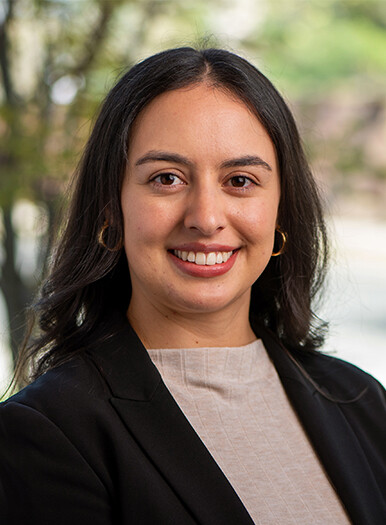
Maria Gracia Naranjo Ponce ’22 LLM
A perspective on the intellectual international community of the LL.M. program, and how she developed her research ideas on tax law.
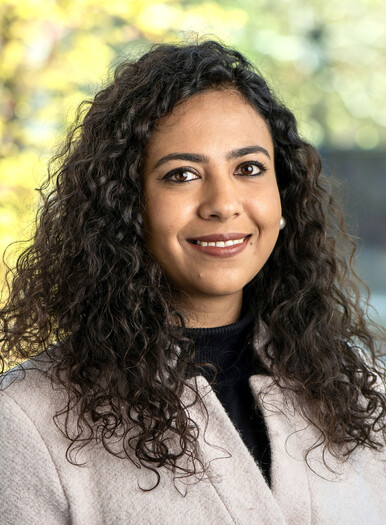
Akriti Gaur ’22 LLM
A student perspective on the LL.M. program, and how Yale Law School offered theoretical foundations to previous experience as a tech lawyer.
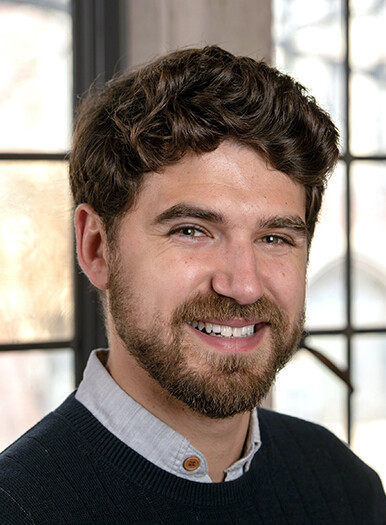
Thomas Kadri PhD
A student perspective on the Ph.D. in Law program and his research on tort liability.
Graduate Student Life
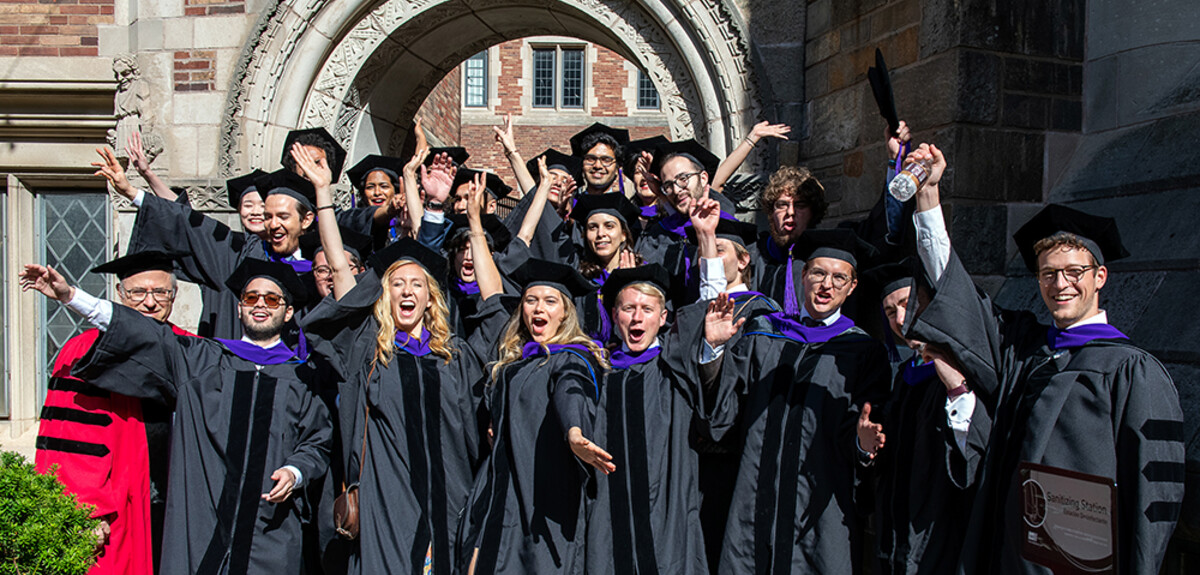
2020 and 2021 Graduate Programs alumni celebrate in the YLS Courtyard with Assistant Dean Gordon Silverstein before their in-person ceremony in May 2022
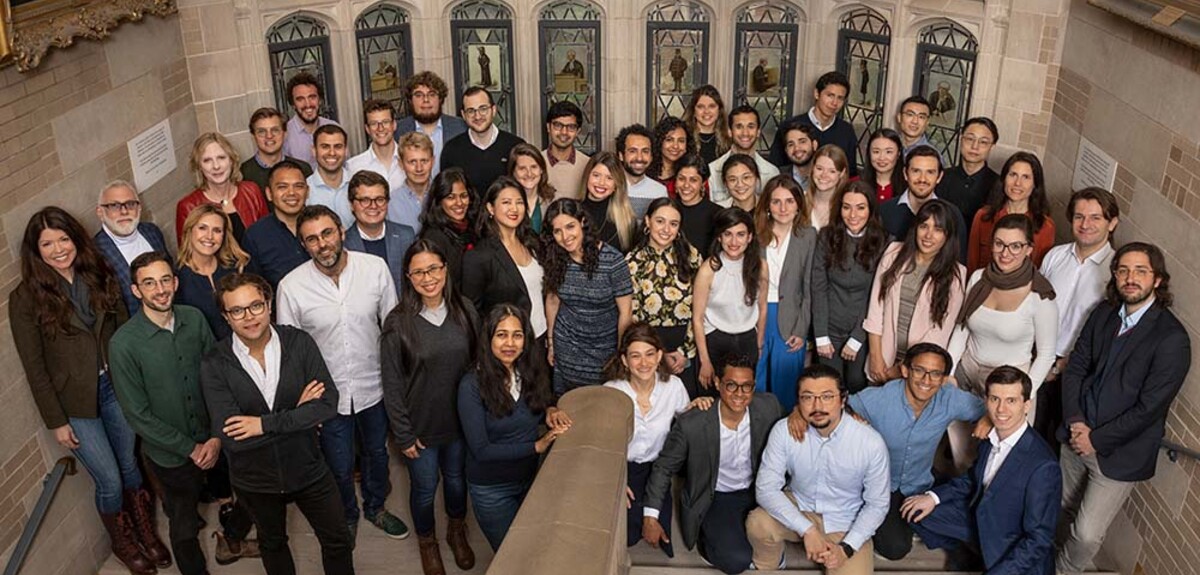
2022 Graduate Program degree candidates with Dean Heather K. Gerken in April 2022
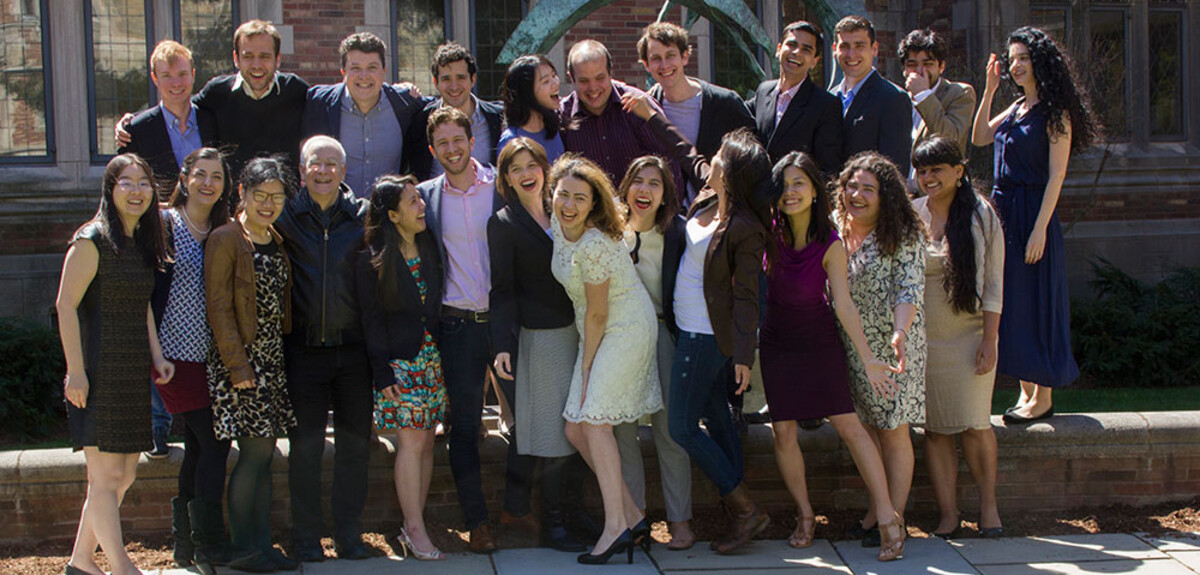
We want you to think of Yale not just as the place you received your legal education, but as one of the places where you found your moral compass.
- Request Info
- Browse Degrees
- Student Resources
- Faculty Resources
- Diversity, Equity & Inclusion
- Give to SLU
- Search & Directory
Health Care Ethics, Ph.D.
- Learning Outcomes
- Requirements
- Contact Info
Saint Louis University’s doctoral program in health care ethics prepares students for a successful career in academic, corporate, research or clinical bioethics settings.
Curriculum Overview
SLU’s Ph.D. in health care ethics is offered by the Albert Gnaegi Center for Health Care Ethics . The health care ethics Ph.D. integrates an interdisciplinary curriculum with several practica and offers four concentrations to further specialize your doctoral studies.
All students in the traditional Ph.D. in health care ethics program are required to complete 60 credits of coursework in five categories of courses:
- Foundations of Health Care Ethics (12 credits)
- Context of Health Care (12 credits)
- Disciplinary Lens (12 credits)
- Bioethics Content (12 credits)
- Dissertation Research (12 credits)
With the approval of the Ph.D. program director, up to 12 credits (in 5000-level courses or higher) from previous graduate coursework may count as advanced standing toward the disciplinary lens or bioethics content elective categories. Students pursuing the J.D./Ph.D., M.D./Ph.D., M.A./Ph.D. or the joint Ph.D. in theology and health care ethics follow a modified curriculum.
You may opt to complete a concentration in one of four areas: Catholic tradition, clinical ethics, empirical research methods or research ethics.
Catholic Tradition Concentration
Students enrolled in the Ph.D. program in health care ethics may take 15 credits of coursework with an emphasis on health care ethics in the Catholic tradition and write a dissertation (12 credits) in the Catholic tradition to develop expertise in the area of Catholic health care ethics. To enroll in the concentration in health care ethics in the Catholic tradition, students must already hold a master’s degree in theology or religious studies or be enrolled in the M.A./Ph.D. dual-degree program.
Clinical Ethics Concentration
Students enrolled in the Ph.D. program in health care ethics may take 15 credits of coursework with an emphasis on clinical ethics (12 credits). They'll also write a dissertation on a topic relevant to clinical ethics to develop clinical health care ethics expertise.
Empirical Research Concentration
With the approval of the concentration directors and the Ph.D. program director, students enrolled in the Ph.D. program in health care ethics may opt to complete this concentration to develop expertise in empirical research methods. This concentration prepares students to incorporate empirical methods into a normative dissertation and future research. The focus of the track will be on qualitative research methods (such as ethnography, interviews, focus groups, public deliberation, etc.), though, in consultation with the directors of the concentration, students will have the option of adopting quantitative or mixed methods approaches. Completion of the concentration is meant to indicate special competencies over and above those gained in the Ph.D. program, specifically those that pertain to qualitative empirical research in the field of bioethics.
Students must elect to pursue this concentration by the end of their first semester at the latest. A concentration director must approve the empirical concentration curriculum plan of each student. The concentration requires at least 12 hours of coursework.
Research Ethics Concentration
Students enrolled in the Ph.D. program in health care ethics may take 15 credits of coursework with an emphasis on research ethics and write a dissertation (12 credits) in research ethics to develop expertise in the area of human research ethics.
Fieldwork and Research Opportunities
All Ph.D. students take a three-semester, 150-hour clinical practicum to gain experience working in a clinical setting. Students interested in the clinical ethics concentration can complete an additional advanced practicum in which students are placed in active clinical ethics consultation services for 300+ hours. In addition to these fieldwork opportunities, most Ph.D. students graduate with two or more publications.
Professionals from the fields of law, medicine, nursing, public health, philosophy and religious studies have joined SLU’s Ph.D. program in health care ethics. Our graduates have been highly successful in finding excellent full-time positions both in education (teaching and conducting research in health care ethics) and in health care systems (as professional ethicists).
Admission Requirements
Students entering the Ph.D. program in health care ethics will have an undergraduate or graduate degree in a relevant field, for instance, philosophy, theology, a clinical field, social sciences or law. Successful applicants usually have a high GPA, high GRE percentiles (especially in the verbal and analytical writing categories), a strong normative writing sample and a demonstration of overall fit with the program’s educational objectives.
The Catholic Health Association has recommended that ethicists working in Catholic health care with an interdisciplinary Ph.D. degree should additionally hold an M.A. in theology. It is strongly recommended that students who do not already hold an M.A. in theology complete the dual-degree program, offered in collaboration with the Aquinas Institute of Theology. Alternately, students should plan on completing an M.A. prior to commencing work in Catholic health care.
Application Requirements
- Transcript(s)
- Three letters of recommendation
- Writing sample
- Professional goal statement
- Application deadline Dec. 1
Requirements for International Students
All admission policies and requirements for domestic students apply to international students. International students must also meet the following additional requirements:
- Demonstrate English Language Proficiency
- Courses taken and/or lectures attended
- Practical laboratory work
- The maximum and minimum grades attainable
- The grades earned or the results of all end-of-term examinations
- Any honors or degrees received.
- WES and ECE transcripts are accepted.
- A letter of financial support from the person(s) or sponsoring agency funding the student's time at Saint Louis University
- A letter from the sponsor's bank verifying that the funds are available and will be so for the duration of the student's study at the University
Assistantship Deadline
Applicants who are admitted to the Ph.D. program will be invited to submit a separate application for assistantship funding. Contact the Ph.D. program director for more information.
Review Process
Applications are reviewed by a committee of faculty members from the Albert Gnaegi Center for Health Care Ethics.
| Tuition | Cost Per Credit |
|---|---|
| Graduate Tuition | $1,370 |
Additional charges may apply. Other resources are listed below:
Net Price Calculator
Information on Tuition and Fees
Miscellaneous Fees
Information on Summer Tuition
Scholarships, Assistantships and Financial Aid
For priority consideration for a graduate assistantship, apply by the program admission deadlines listed. Fellowships and assistantships provide a stipend and may include health insurance and a tuition scholarship for the duration of the award.
Explore Scholarships and Financial Aid Options
- Graduates will be able to demonstrate a broad knowledge of the foundational disciplines, methods, topics and issues in health care ethics required for the scholarly analysis of issues in the field.
- Graduates will be able to demonstrate proficiency in formulating original, normative arguments on topics related to health care ethics.
- Graduates will be able to demonstrate the ability to conceptualize, develop and bring to successful completion an original, sustained and coherent independent research project that contributes to the field (i.e. the dissertation).
- Graduates will be able to demonstrate an ability to generate appropriate job search materials (i.e. curriculum vitae, teaching portfolio, writing sample, etc.)
| Code | Title | Credits |
|---|---|---|
| Foundations of Health Care Ethics | ||
| HCE 6010 | Methods in Philosophical Ethic | 3 |
| HCE 6020 | Methods in Religious Ethics | 3 |
| HCE 6040 | Interdisciplinary Research in Health Care Ethics | 3 |
| Foundations Elective | ||
| Select one of the following: | 3 | |
| Philosophical Foundations | ||
| Foundations of Catholic Morality | ||
| Ethical Issues in Public Health | ||
| Context of Health Care | ||
| HCE 6110 | Intro-Medicine for Ethicists | 1 |
| HCE 6120 | Bioethics and the Law | 2 |
| HCE 6130 | Clinical Ethics | 3 |
| HCE 6140 | Research Ethics | 3 |
| HCE 6150 | Practicum, Health Care Ethics | 3 |
| Disciplinary Lens | ||
| The Disciplinary Lens courses are elective courses that provide students the opportunity to gain a deeper understanding of a primary disciplinary lens (e.g. philosophy, theology, empirical methods, anthropology/sociology), through which topics and arguments in the field might be examined and constructed. The disciplinary lens courses should ideally correspond to the student’s intended dissertation method and should ordinarily be clustered in the same discipline. These courses are electives and students are encouraged to take courses in outside departments, with the approval of the PhD Program Director. Up to 9 credit hours of advanced standing from previous graduate coursework may be applied to these 12 credit hours, with the approval of the PhD Program Director. | 12 | |
| Bioethics Content | ||
| The Bioethics Content courses are elective courses that provide students exposure to a variety of health care ethics-related topics, thinkers and practices. Ideally, at least some of the Bioethics Content courses should correspond to the student’s intended dissertation topic. These courses are electives and students are encouraged to take courses in outside departments, with the approval of the PhD Program Director. Up to 9 credit hours of advanced standing from previous graduate coursework may be applied to these 12 credit hours, with the approval of the PhD Program Director. | 12 | |
| Dissertation Research | 12 | |
| Dissertation Research (taken over multiple semesters) | ||
| Students may select one of the following optional concentrations: | ||
| Total Credits | 60 | |
Non Course Requirements
Research tools.
These competencies are essential for success in health care ethics. Students may develop these competencies through different mechanisms.
- Competency in medical terminology
- Competency in library database skills
- Competency in reading statistics and study design
Comprehensive Examinations
The comprehensive examinations occur after completing all coursework and practica.
Dissertation Proposal
The student will work closely with the dissertation chair to select a dissertation topic and plan the dissertation proposal in a timely manner. In the dissertation proposal, the student must present substantial evidence of the ability to develop and sustain an extended normative project on a bioethics topic. Once the chair is satisfied with the proposal, it will be sent to the two faculty readers for their comments. It is at this stage that the readers are expected to influence the general outline of the dissertation. The student will then address the comments of the readers and submit a revised proposal to the chair. This process may be repeated until the chair, readers and student are satisfied with the proposal.
Dissertations: Nontraditional Format
Ordinarily, doctoral candidates in the Ph.D. program in health care ethics will follow the traditional guidelines for dissertations. However, when appropriate, a student’s dissertation committee may permit the student to write a dissertation using a nontraditional format, the body of which consists of at least three thematically related original article-length manuscripts, at least two of which must be accepted for publication. As is always the case, all dissertation content must receive final approval by the student’s dissertation committee. The mere fact that a manuscript has been published or accepted for publication does not guarantee that it can be used toward a nontraditional dissertation. Ordinarily, if a faculty member serves as a co-author on one of the publications, this faculty member would not serve as the student’s dissertation chair. The nontraditional dissertation format requires that:
- The three incorporated articles be preceded by a substantive introduction chapter and followed by a substantive conclusion chapter, which will integrate the three manuscripts into a coherent whole.
- Ordinarily, the student is the sole or primary author of all three manuscripts.
- At least two of the three manuscripts must be fully accepted for publication and the third at least under review.
- Dissertations must satisfy the formatting requirements dictated by the "Policies and Procedures for Thesis, Project, and Dissertation Formatting."
- All articles incorporated into the dissertation must have been submitted while enrolled in the Ph.D. program.
Oral Defense of the Dissertation
Upon completion of the dissertation, students publicly present and defend their dissertation before their dissertation committee, CHCE faculty and doctoral students.
Continuation Standards
Students must maintain a cumulative grade point average (GPA) of 3.50 in all graduate/professional courses.
| Code | Title | Credits |
|---|---|---|
| HCE 6130 | Clinical Ethics | 3 |
| HCE 6540 | Advanced Clinical Ethics Practicum | 3 |
| Elective | Additional Course in Clinical Ethics | 3 |
| HCE 6150 | Practicum, Health Care Ethics (Students will complete portions of their practicum in the area of clinical ethics) | 3 |
| HCE 6980 | Graduate Reading Course | 3 |
| Dissertation on a Clinical Ethics Topic | 12 | |
| Dissertation Research | ||
| Total Credits | 27 | |
| Code | Title | Credits |
|---|---|---|
| HCE 6020 | Methods in Religious Ethics | 3 |
| HCE 6310 | Health Care Ethics: Catholic Tradition | 3 |
| Elective | Additional Course in Health Care & Catholic Tradition (usually taken outside of HCE) | 3 |
| HCE 6980 | Graduate Reading Course | 3 |
| HCE 6150 | Practicum, Health Care Ethics | 3 |
| Dissertation on Health Care Ethics in the Catholic Tradition | 12 | |
| Dissertation Research | ||
| Total Credits | 27 | |
Empirical Research Methods Concentration
| Code | Title | Credits |
|---|---|---|
| HCE 6040 | Interdisciplinary Research in Health Care Ethics | 3 |
| HCE 6520 | Quantitative Research in Descriptive Ethics | 3 |
| HCE 6150 | Practicum, Health Care Ethics (Students will focus on the population the student intends to research in their dissertation) | 3 |
| Qualitative Methods Elective | ||
| Two (preferably three) graduate-level level qualitative methods courses, usually outside HCE. The third course can be either a methods course or a course covering the content area of the student's empirical research. | 6 | |
| Total Credits | 15 | |
| Code | Title | Credits |
|---|---|---|
| HCE 6140 | Research Ethics | 3 |
| Elective in Research Methodology | ||
| Concentration students would be required to take a class in research methodology or would be required to demonstrate advanced standing in this area. This will be treated as one of the Topics and Scholars electives required as part of the PhD program. | 3 | |
| Elective | Additional Course in Research Ethics | 3 |
| HCE 6980 | Graduate Reading Course | 3 |
| HCE 6150 | Practicum, Health Care Ethics | 3 |
| HCE 6990 | Dissertation Research (with focus on research ethics) | 3 |
| Total Credits | 18 | |
Roadmaps are recommended semester-by-semester plans of study for programs and assume full-time enrollment unless otherwise noted.
Courses and milestones designated as critical (marked with !) must be completed in the semester listed to ensure a timely graduation. Transfer credit may change the roadmap.
This roadmap should not be used in the place of regular academic advising appointments. All students are encouraged to meet with their advisor/mentor each semester. Requirements, course availability and sequencing are subject to change.
| Year One | ||
|---|---|---|
| Fall | Credits | |
| HCE 6050 | Philosophical Foundations | 3 |
| HCE 6040 | Interdisciplinary Research in Health Care Ethics | 3 |
| HCE 6110 | Intro-Medicine for Ethicists | 1 |
| Library Database Skills | 0 | |
| Credits | 7 | |
| Spring | ||
| HCE 6130 | Clinical Ethics | 3 |
| LAW 8005 | Bioethics and the Law | 2 |
| HCE 6150 | Practicum, Health Care Ethics | 1 |
| Elective | 6xxx-level HCE course or course in a related discipline approved by the PhD Program Director | 3 |
| Credits | 9 | |
| Year Two | ||
| Fall | ||
| HCE 6010 | Methods in Philosophical Ethics | 3 |
| HCE 6020 | Methods in Religious Ethics | 3 |
| HCE 6150 | Practicum, Health Care Ethics | 1 |
| Elective | 6xxx-level HCE course or course in a related discipline approved by the PhD Program Director | 3 |
| Credits | 10 | |
| Spring | ||
| HCE 6140 | Research Ethics | 3 |
| HCE 6150 | Practicum, Health Care Ethics | 1 |
| Elective | 6xxx-level HCE course or course in a related discipline approved by the PhD Program Director | 3 |
| HCE 6980 | Graduate Independent Study in Health Care Ethics | 3 |
| Credits | 10 | |
| Year Three | ||
| Fall | ||
| Comprehensive Exam (Written exam and oral exam) | 0 | |
| HCE 6990 | Dissertation Research | 6 |
| Credits | 6 | |
| Spring | ||
| HCE 6990 | Dissertation Research | 6 |
| Credits | 6 | |
| Year Four | ||
| Fall | ||
| HCE 6990 | Dissertation Research | 0 |
| Credits | 0 | |
| Spring | ||
| HCE 6990 | Dissertation Research | 0 |
| Credits | 0 | |
| Year Five | ||
| Fall | ||
| HCE 6990 | Dissertation Research | 0 |
| Credits | 0 | |
| Spring | ||
| HCE 6990 | Dissertation Research | 0 |
| Credits | 0 | |
| Total Credits | 48 | |
Take either course depending on interest and career goals. May take both, with the second acting as an elective.
Take the “Consuming Empirical Literature” exam the first day of class.
Take the “Medical Terminology” exam the first day of class.
An introduction to graduate-level database and library search skills, taught by library faculty.
Complete the clinical shadowing eligibility requirements prior to beginning of class.
Program Notes
- Students are encouraged to concentrate elective courses in a primary methodological or content area, versus a broad sampling of courses. Common choices are 6xxx-level courses in theology and philosophy.
- Concentration in Research Ethics : Electives focus on topics related to research ethics, and the dissertation will be written on a research ethics topic. One elective will be in research methodology; one elective will be an Advanced Research Ethics Practicum; one elective will be a non-HCE elective related to research ethics and the elective in the final semester will be a directed reading on research ethics, preparing the student’s dissertation prospectus.
- Concentration in Catholic Tradition : Electives focus on topics related to Catholic health care ethics, and the dissertation will be written on a Catholic health care topic. One elective will be HCE 6310 Health Care Ethics: Catholic Tradition (3 cr) ; one elective will be an elective related to health care and the catholic tradition, usually in theology; the elective in the final semester will be a directed reading on Catholic health care ethics, preparing the student’s dissertation prospectus.
- Concentration in Clinical Ethics : Electives focus on topics related to clinical ethics, and the dissertation will be written on a clinical ethics topic. One elective will be HCE 6540 Advanced Clinical Ethics Practicum (3 cr) ; one elective will be a non-HCE elective related to clinical ethics and the elective in the final semester will be a directed reading on clinical ethics, preparing the student’s dissertation prospectus.
- Concentration in Empirical Research Methods in Ethics : Electives focus on topics related to empirical research methods, and the dissertation will be written using an empirical research method. Two (preferably three) electives will be graduate-level methods courses taught outside HCE and the elective in the final semester will be HCE 6520 Quantitative Research in Descriptive Ethics (3 cr) , preparing the student’s dissertation prospectus.
For additional information about our program, please contact:
Harold Braswell, Ph.D. Graduate program coordinator, health care ethics [email protected]
Health Law and Policy Clinic
Center for Health Law and Policy Innovation 1607 Massachusetts Avenue, 4th Floor Cambridge, MA 02138
Clinic's Website
View this post on Instagram A post shared by Harvard Law School (@harvardlaw)
Students enrolled in the Health Law and Policy Clinic will work on cutting-edge legislative, regulatory, and litigation projects at the state and national levels aimed at increasing access to quality, comprehensive health care for poor and low-income individuals and families. Student projects involve:
- informing current debates on the Affordable Care Act and efforts to repeal and replace the law;
- providing law and policy analysis to national and state coalitions advocating to protect Medicaid, Medicare, and discretionary health and public health programs;
- investigating best practices for initiatives to address health disparities and reduce barriers to health care for our most vulnerable populations; and
- litigating to address unfair and discriminatory public and private health insurance practices.
National-level work involves advising government actors and leading chronic illness and disability partnerships to promote health and public health reform initiatives. State-level work allows students the opportunity to travel to facilitate trainings and meetings and to support advocacy and litigation strategy development on a broad range of current health and public health concerns.
Over the course of a semester, students work closely with clinical faculty to become skilled, innovative, and thoughtful practitioners. Students gain a wealth of hands-on experience in current and emerging health law and policy issues, and develop written products such as fact sheets, in-depth reports, comment letters, testimony, presentations, draft legislation, regulatory guidance and brief writing and research in ongoing litigation. Students have the opportunity to develop a range of problem-solving, policy analysis, research and writing, oral communication, advocacy and leadership skills. The Clinic’s on-campus office is in the 1607 Massachusetts Avenue building, where students will meet with their clinical supervisors and colleagues; students also have significant flexibility to work offsite.
How to Register
Students in the fall clinic enroll in either the fall Public Health Law & Policy seminar or the Health Care Rights in the 21st Century seminar. Spring clinical students enroll in either the spring Public Health Law & Policy seminar or the spring Policy Advocacy Workshop. Enrollment is coordinated by the Office of Clinical and Pro Bono Programs.
The clinic is offered in the Fall and Spring semesters. You can learn about the required clinical course component, clinical credits and the clinical registration process by reading the course catalog description and exploring the links in this section.
- Course Catalog
- Clinic Overview and Sample Schedule
- Clinics in a Minute Video
- Registering for Clinics
Meet the Instructors
Carmel shachar, assistant clinical professor of law; faculty director, center for health law and policy innovation.
Carmel Shachar, JD, MPH, is Assistant Clinical Professor of Law and Faculty Director of the Health Law and Policy Clinic at the Center for Health Law and Policy Innovation at Harvard Law School (CHLPI).
Ms. Shachar focuses her scholarship on law and health policy, in particular the regulation of access to care for vulnerable individuals, the use of telehealth and digital health products, and the application of public health ethics to real world questions. Her work has been published in leading health and law journals, including the New England Journal of Medicine, JAMA, Nature Medicine, and the Journal of Law and the Biosciences, and she has been interviewed by major media outlets, such as BBC News, Politico, CNN, and Slate. She has co-edited several books, including “ Innovation and Protection: The Future of Medical Device Regulation ,” “ Consumer Genetics: Ethical and Legal Considerations of New Technologies ,” “ Disability, Health, Law, and Bioethics ,” “ Transparency in Health and Health Care in the United States ,” and “ COVID-19 and the Law .” She also has authored amicus briefs submitted to the United States Supreme Court on health care and access to care issues.
Previously, Ms. Shachar was the Executive Director of the Petrie-Flom Center for Health Law Policy, Biotechnology, and Bioethics at Harvard Law School. During her time at the Petrie-Flom Center, she was responsible for oversight of the Center’s sponsored research portfolio, event programming, fellowships, student engagement, development, and a range of other projects and collaborations. During her tenure, she designed, recruited for, and launched both the Center’s Health Care General Counsel Roundtable and the Center’s Advisory Board. She was also involved heavily with the center’s Project on Precision Medicine, Artificial Intelligence, and the Law, and its Diagnosing in the Home Initiative.
Ms. Shachar was previously a Clinical Instructor on Law at the Health Law and Policy Clinic, where she helped lead CHLPI’s access to care and Affordable Care Act implementation work. Ms. Shachar focused on analyzing and translating health policy issues and opportunities for a broad range of audiences, including many federal and state-level health policy coalitions. Ms. Shachar also practiced health care law at Ropes & Gray, LLP in Boston, Massachusetts.
Ms. Shachar clerked for Hon. Jacques L. Wiener of the Fifth Circuit Court of Appeals. Ms. Shachar graduated cum laude from Harvard Law School and the Harvard T. H. Chan School of Public Health. She studied Bioethics and Religion at Wellesley College.
Kevin Costello
Litigation director.
Kevin Costello is the Senior Associate Director of the Center for Health Law and Policy Innovation and directs the Center’s litigation efforts. Prior to coming to CHLPI, Kevin was in private practice for eight years, most recently as a principal at Klein Kavanagh Costello, LLP. Kevin’s practice involved complex litigation in the fields of housing, health care, civil rights, antitrust and consumer law. He has been appointed by federal courts across the country to represent classes in Multi-District Litigation, as well as in nationwide class action litigation. Kevin has brought lawsuits against major banks for broken promises arising from the federal government’s Home Affordable Modification Program, challenged the broadcast blackout restrictions of Major League Baseball and the National Hockey League and fought against the practices of law firms and banks in Massachusetts that improperly foreclosed on financially vulnerable homeowners. Kevin was also part of the team that litigated a series of cases uncovering systemic racial discrimination in the mortgage lending field. Prior to entering private practice, Kevin was a staff attorney at Community Legal Services in Philadelphia, helping seniors navigate the health care system. In this role, he fought to ensure that his low-income clients were treated fairly in the roll-out of the Medicare prescription drug benefit and litigated to enforce their rights in various public benefit and health care systems. Mr. Costello is an honors graduate of both Boston College and the University of Pennsylvania Law School. He served as law clerk to both the Hon. Joseph H. Rodriguez of the U.S. District Court for the District of New Jersey and the Hon. Francis X. Spina of the Massachusetts Supreme Judicial Court.
Katie Garfield
Director of whole person care; clinical instructor.
Katie is a Clinical Instructor at the Center for Health Law and Policy Innovation of Harvard Law School. Katie joined the Center in 2014 and currently focuses her work on the Center’s whole-person care initiatives, including the Center’s Food is Medicine project. In her work on these initiatives, she has had the opportunity to work with community-based organizations, state agencies, health care providers, and coalitions to develop strategies to increase access to innovative services such as Food is Medicine interventions. Prior to joining the Center, Katie was an associate at Ropes & Gray LLP. She is a licensed member of the Massachusetts Bar.
Erika Hanson
Clinical instructor.
Erika joined the Center for Health Law and Policy Innovation of Harvard Law School in 2022 as a Clinical Instructor in the Health Law and Policy Clinic. Prior to joining HLPC, she was a Staff Attorney at The Legal Aid Society in New York City for nearly five years, where she represented clients, conducted class action litigation, and led policy advocacy on a wide range of issues including access to benefits, medical service denials, discrimination in health care, and the reduction and elimination of medical debt and Medicaid overpayments. Prior to working at The Legal Aid Society, Erika was a Georgetown Women’s Law and Public Policy Fellow and a Reproductive Rights & Health Legal Fellow at the National Women’s Law Center in Washington, D.C. She has published scholarly articles in the Hastings Constitutional Law Quarterly and the St. Louis University Law Journal. She is a licensed member of the New York State bar.
Elizabeth Kaplan
Elizabeth joined the Center for Health Law and Policy Innovation in 2022. Prior to joining CHLPI, Elizabeth worked as an Assistant Attorney General for Massachusetts Attorney General Maura Healey. There, Elizabeth represented a variety of state agencies, including MassHealth, in institutional reform and other litigation. Elizabeth also has experience working in a medical-legal partnership, where she provided direct legal services to low-income clients with chronic conditions such as HIV/AIDS and mental illness. Her work spanned a variety of areas, including legal issues related to Medicare, Medicaid, and the rollout of the Affordable Care Act.
Elizabeth clerked for the Hon. Margot Botsford of the Massachusetts Supreme Judicial Court. She earned her JD from the University of California, Berkeley Law School, and her BA from Williams College. She is a licensed member of the Massachusetts Bar.
Rachel Landauer
Rachel joined the Harvard Law School Center for Health Law and Policy Innovation in July 2018 as a Clinical Fellow in the Health Law and Policy Clinic. Rachel graduated from UCLA School of Law in May 2016 as a member of the David J. Epstein Program in Public Interest Law and Policy, and with a Master of Public Health degree from the UCLA Fielding School of Public Health. During law school, she worked with projects and organizations including the American Civil Liberties Union’s Reproductive Freedom Project, the National Health Law Program, and the Los Angeles HIV Law & Policy Project, and co-chaired UCLA’s Health Law Society. Immediately prior to joining the Center, Rachel was an associate at Sheppard, Mullin, Richter & Hampton LLP, focusing on health care regulatory and compliance matters.
Maryanne Tomazic
Maryanne Tomazic (she/her) is a clinical instructor at the Center for Health Law and Policy Innovation of Harvard Law School. She is a public health lawyer, with a focus on health care policy, private health insurance, health care nondiscrimination, and access to gender-affirming and sexual/reproductive health care. Prior to law school, Maryanne worked at the intersection of health care reform and reproductive justice at Raising Women’s Voices (Community Catalyst), served as an elected official on a board of education, and volunteered as an emergency medical technician for many years. Her work is also informed by her experience growing up with immigrant family and her academic training at Boston University School of Law (Health Law), Columbia University’s Mailman School of Public Health (History and Ethics of Public Health), and Swarthmore College (Biology). She is licensed in New York.
Anu Dairkee
Clinical fellow.
Anu joined CHLPI as a Clinical Fellow on the Health Care Access team in 2023. Anu is a former physician who is focused on health equity and access issues. While in law school Anu worked on a variety of health law justice projects including one that educated providers about their rights regarding police questioning in hospital and healthcare settings. Additionally, Anu helped develop a policy recommendation on behalf of Medicaid AABD clients in Illinois which advocates for the elimination of the asset test requirement. Anu also coauthored a note and cohosted a podcast exploring the effects of social media on direct-to-consumer advertising in the pharmaceutical space on patient drug choice.
As a physician Anu focused on clinical research directed at improving hospital admission processes for hematology patients. Anu was also part of a team that worked on creating community-based mental health services for immigrant populations. Anu hopes to use the lessons she learned as a physician to better inform her practice as a health law attorney focused on improving access and equity in our health care system. Anu has an MD from the University of the West Indies, St. Augustine and a JD with a focus on health law and compliance studies from Loyola University Chicago School of Law.
Sara joined the Center for Health Law and Policy Innovation in 2023 as a Health Law and Policy Clinical Fellow with the Whole Person Care Team. Sara holds a Master of Laws (LL.M.) from Harvard Law School, where her focus was on health and technology law policy. During her LL.M., Sara served as a Research Assistant at the Petrie-Flom Center for Health Law Policy, Biotechnology, and Bioethics at Harvard Law School, working for the Digital Home Health Initiative at the Center. She was also a clinical student attorney at the Cyberlaw Clinic at the Berkman Klein Center for Internet & Society at Harvard University. Sara is a practicing attorney from Pakistan, where prior to her LL.M., she worked on the landmark virginity testing case, and led numerous women empowerment, and diversity, equity, and inclusion initiatives.
Staff Attorney
John (he/they) joined the Center for Health Law and Policy Innovation of Harvard Law School in 2022 as a Staff Attorney in the Health Law and Policy Clinic. Prior to joining the Center, John was a staff attorney at the Health Law Institute in Jamaica Plain where he provided free legal services to people living with or at high risk of HIV. His prior work focused on a variety of areas, including tenant rights, public benefit appeals, and criminal record sealing. John also has expertise in LGBTQ+ organizing, harm reduction and substance use disorder, and policing and public health. He graduated from Northeastern University School of Law in May 2019 and is a licensed member of the Massachusetts Bar.
Staff Members
| Laura Johnston | Administrative Director | |
| Ada Ezeokoli | Communications Manager |
In the News
Elimination of sobriety requirements and 1115 waiver approvals signal progress toward equitable hcv treatment access.
Washington, D.C. – August 14, 2024 – The Center for Health Law and Policy Innovation of Harvard Law School (CHLPI) and the National Viral Hepatitis Roundtable (NVHR) recently published updates to their state […] The post Elimination of Sobriety Requirements and 1115 Waiver Approvals Signal Progress Toward Equitable HCV Treatment Access appeared first on Center For Health […]
August 14, 2024
Medicaid Unwinding Winds Down: What We’ve Learned – Health Care in Motion
State Medicaid programs are at the tail end of an unprecedented reduction in Medicaid enrollment. States are reinstituting normal Medicaid redetermination and renewal processes, which were paused during the height […] The post Medicaid Unwinding Winds Down: What We’ve Learned – Health Care in Motion appeared first on Center For Health Law and Policy […]
Protecting Trans Health Care: Battling Gender-Affirming Care Bans in the Courts – Health Care in Motion
Last month, in between issuing decisions about mifepristone, EMTALA, Chevron deference, and presidential immunity, the Supreme Court of the United States also agreed to review a case that could upend […] The post Protecting Trans Health Care: Battling Gender-Affirming Care Bans in the Courts – Health Care in Motion appeared first on Center For […]
August 1, 2024
Braidwood Management v. Becerra: Updated FAQs for Health Advocates and Providers
The Center for Health Law and Policy Innovation (CHLPI) has released updated FAQs intended to help health care advocates, providers, and individuals understand key issues at stake in Braidwood Management v. Becerra, […] The post Braidwood Management v. Becerra: Updated FAQs for Health Advocates and Providers appeared first on Center For Health Law and Policy Innovation […]
July 22, 2024
Modal Gallery
Gallery block modal gallery.

See why the U of I College of Law is an excellent choice for your academic and professional success. See our viewbook
- Admitted Students
- Application Status
- Tuition & Costs
Emphasis Areas
- Business Law
- Environmental Law
- LSAT Prep Courses
- Student Accounts

Academic Administration
Important dates, class schedules, registration, honor code, and other general information for students. More Information
- Academic Calendar
- Room Calendars
Get Involved
- Student Organizations
- Pro Bono Program
- Externships
- Student Handbook
- Academic Success
- Law IT Services

Faculty-Staff Handbook
The Faculty-Staff Handbook provides an online reference for University of Idaho policies. View the FSH
Common Tools
- Human Resources
- Recreation and Wellbeing
- Administrative Procedures Manual (APM)
- Dates & Deadlines

You Can Inspire The Future
Support our students and programs at the College of Law. Inspire the future
Stay Connected
- Meet our Alumni
- Alumni Awards
- Law Advisory Council
- U of I Alumni Assoc.
- Law Library Service
- Find a Vandal
- VandalStore
- Liberty Mutual Benefits
College of Law

Finding Direction
Future Lawyers Discover Rural Opportunities

Embracing New Beginnings
Law Student Discovers Career by Leaning Into Opportunities

Argue Before the Ninth Circuit
Hands-on learning with our nationally recognized practical training programs Clinics

State Capital and Business Center
Boise in the south, at the governmental and business center of Idaho

Charming, College Town
Moscow in the north, on the main university campus

Grow with Idaho’s Business Leaders
Learn about our emphasis in Business Law, and our nationally recognized IP Law track

Native American Law
Learn more about the law by and between Tribal, Federal, and State governments
Email: [email protected]
Web: College of Law
Physical Address: Menard 101 711 S. Rayburn Drive
Mailing Address: College of Law University of Idaho 875 Perimeter Drive MS 2321 Moscow, ID 83844-2321 Main Office: 208-885-2255 Admissions: 208-885-2300 Legal Clinic: 208-885-6541 Office of the Dean: 208-364-4620
Fax: 208-885-5709
Physical Address: 501 W Front St, Boise, ID 83702
Mailing Address: 501 W Front St, Boise, ID 83702
Phone: 208-885-2255
Fax: 208-334-2176
The College of Law has emerged as one of the best educational values in the nation. The college’s success is built upon a steadfast belief that a law school should stand for serving the public, promote civil discourse, contribute to the dialogue on critical issues and provide access across all cultures and ideologies to the highest quality of legal education.
For students from outside Idaho, our non-resident tuition is significantly lower than schools in surrounding states. In addition, students from the 16 WICHE participating states and territories are eligible for in-state tuition through the Western Regional Graduate Program ( WRGP ).

Take a look at our law school, programs and faculty through our beautiful viewbook.
See Our Viewbook
Explore our College
Apply today.
As a fully accredited law school in the state of Idaho, the U of I College of Law is committed to providing high-quality, affordable public legal education statewide.
Apply to the College of Law
Located in Idaho’s capital, our Boise location puts students in the middle of the government and business center of Idaho.
Visit Boise
Located on the University of Idaho campus, our Moscow location offers options for interdisciplinary study, seven concurrent degrees and expanded class offerings.
Visit Moscow

Visit U of I
Learn about the many reasons the University of Idaho could be a perfect fit for you. Schedule Your Visit
- Discover a Career
- Find a Major
- Experience U of I Life
More Resources
- Admitted Students
- International Students
Take Action
- Find Financial Aid
- View Deadlines
- Find Your Rep

Helping to ensure U of I is a safe and engaging place for students to learn and be successful. Read about Title IX
Get Involved
- Clubs & Volunteer Opportunities
Campus Recreation
- Student Government
- Sustainability Center
- Academic Assistance
- Safety & Security
- Career Services
- Health & Wellness Services
- Register for Classes
- Dates & Deadlines
- Financial Aid
- U of I Library

Homecoming Oct. 14 - 21
Join other Vandal families for a week of celebration and Vandal traditions. View Calendar
Stay Connected
- Upcoming Events
- Here We Have Idaho Magazine
- Support Services
- About Moscow
- Commencement
- Dads' Weekend
- Moms' Weekend

- U of I Retirees Association
UIRA has a membership of nearly 500 from every part of the University. Learn about UIRA
- Submit Class Notes
- Make a Gift
- View Events
- Vandal Pride Products
- Vandal Voyagers Program
- Alumni Chapters
- University Magazine
- Alumni Newsletter

Gym memberships and wellness class passes are available for faculty, staff and their spouses. Get Healthy
Common Tools
- Administrative Procedures Manual (APM)
- Class Schedule
- ITS Tech Support
- Academic Dates & Deadlines
- Daily Register
- Faculty Senate
- Staff Council
Application Management
| to continue an application. | to start a new application. |
Office of Admissions
Physical Address: University of Idaho Bruce M. Pitman Center 709 Deakin Street Rm 117 Moscow, ID 83844
Mailing Address: University of Idaho 875 Perimeter Drive MS 4264 Moscow, ID 83844-4264
Phone: 208-885-6326
Fax: 208-885-9119
Email: [email protected]
Web: Office of Admissions
Physical Address: University of Idaho Boise 322 E. Front St Boise, ID 83702
Email: [email protected]
Web: Boise Center
Coeur d'Alene
Physical Address: University of Idaho Coeur d'Alene 1031 N Academic Way Suite 242 Coeur d'Alene, ID 83814
Web: Coeur d'Alene Center
Idaho Falls
Physical Address: University of Idaho Idaho Fall 1776 Science Center Dr. Suite 306 Idaho Falls, ID 83840
Web: Idaho Falls Center

IMAGES
COMMENTS
The PhD in Health Law, Policy, and Management requires completion of a minimum of 73 credit hours, including choosing a dissertation topic and research. Classes will be held virtually with select in-person sessions at our Meharry Medical College campus. This program is intended to accommodate the working adult; therefore, courses are offered ...
Here are the Best Health Care Law Programs. Georgia State University. Saint Louis University. Boston University. Loyola University Chicago. University of Maryland (Carey) Georgetown University ...
The PhD in Health Policy and Management is a full-time doctoral program that trains its students to conduct original investigator-initiated research through a combination of coursework and research mentoring. The curriculum includes core coursework that is common across the four concentrations and courses specific to each individual ...
Stanford Law School is second to none as a training ground for tomorrow's leaders in health law and policy. Four renowned Law School faculty members offer courses in health care law, public health law, and bioethics and advise students interested in careers in the field. Courses in mental health law, food and drug law, mass tort litigation ...
Shaping the Future of Health Law. UCLA faculty are shaping the future of this dynamic and critically important field. Through publications, convenings, and advice to government and industry leaders, they articulate the legal powers, duties, and constraints that apply to government action on health care, public health, and the social determinants of health.
Health Law, Policy & Management. . HLPM is committed to leading scholarship and the public conversation about the most pressing health and social policy concerns of the day. Our research aims to explain the causes of inequities in health and health care, and recommend interventions, laws and policies to reduce them.
The Harvard PhD in Health Policy, awarded by the Harvard Kenneth C. Griffin Graduate School of Arts and Sciences, is a collaborative program among six Harvard University faculties: Faculty of Arts and Sciences, Harvard Business School, Harvard Kennedy School, Harvard Law School, Harvard Medical School, and Harvard T.H. Chan School of Public Health.
Pursue an LL.M. Degree with a Health Law Specialization. The Specialization is a rigorous program designed to prepare lawyers for successful careers in the dynamic field of health law. AUWCL's Health Law and Policy Program is at the forefront of health law and compliance education, specialty ranked #15 by USNWR and accredited by the CCB.
The PhD in Health Policy is a highly interdisciplinary program that will develop the specialized skills you need for a research and teaching career in health policy. The program is collaborative at its core, with its curriculum drawing from six Harvard schools: Harvard Business School. Harvard Kenneth C. Griffin Graduate School of Arts and ...
The Doctor of Philosophy in Health Services & Policy Research (PhD) degree program offered by the Department of Health Law, Policy & Management is designed to provide individuals with excellent research skills for use in academic, industry, or government settings. Students have the opportunity to collaborate with senior faculty in innovative ...
Overview The Coordinated JD/PhD Program is designed for students interested in completing interdisciplinary work at Harvard University and is founded on the belief that students' legal studies and their arts and sciences graduate studies can be mutually enriched through this pursuit. Students completing the coordinated program receive a JD from Harvard Law School (HLS) and […]
The PhD in Health Policy and Management is an academic degree emphasizing the in-depth expertise necessary for a research career. It emphasizes the integration of theory and research in a focused substantive area (cognate). This includes classroom instruction; non-credit seminars; independent study; research projects; academic apprenticeships; and interaction with faculty, fellow students, and ...
The Harvard PhD in Health Policy, awarded by the Faculty of Arts and Sciences, is a collaborative program among six Harvard University faculties: Graduate School of Arts and Sciences, Harvard Business School, Harvard Kennedy School, Harvard Law School, Harvard Medical School, and Harvard School of Public Health. While the program is ...
D.L. in Health Law, SJD in Health Law, Ph.D. in Health Policy, J.D. with joint medical humanities doctorate: Typical Prerequisites: Master's degree in law, health policy or jurisprudence; some programs may require a J.D. or LLM: Common Topics: Biotechnology, children's rights, fraud and abuse, elderly care, health privacy: Job Outlook (2019-2029)
The health law field is as diverse as it is complex. From the local and national policies that determine who has access to health care, to the laws that govern the personal choices we are allowed to make about our own medical treatment, there are many fascinating areas to explore. ... JD/PhD (Public Policy) - Law and the Public Policy; Student ...
Saint Louis University - School of Law. St Louis, MO ·. Saint Louis University ·. Graduate School. ·. 2 reviews. Doctoral Student: SLU Law is a great school. The professors and faculty really care about the students and do their best to support the students. Everyone in the Dean of Students office is amazing, they have really worked to make ...
Educational Opportunities. CDC's Office of Public Health Law Services (OPHLS) and ChangeLab Solutions fellowship, internship, and externship are designed for current graduate students (e.g., MPH, DrPH, MPA, PhD) or law students (JD), as well as recent graduates of these programs (within the past five years), interested in careers in public ...
The Graduate Council will establish the requirements for the second degree. Credit Limitations for Transfer, Correspondence Study, and Non-degree. For the Ph.D. and Ed.D. degrees, a student must complete at least 39 of the 78 required credits at the University of Idaho (U of I) while matriculated in the College of Graduate Studies.
Ph.D. students receive a full-tuition waiver, a health award for health insurance coverage, and a stipend to cover their year-round living expenses, as well as support for participation in national and international conferences. Applications for admission to the Ph.D. in Law program are available starting on August 15. The deadline for ...
The health care ethics Ph.D. integrates an interdisciplinary curriculum with several practica and offers four concentrations to further specialize your doctoral studies. All students in the traditional Ph.D. in health care ethics program are required to complete 60 credits of coursework in five categories of courses: With the approval of the Ph ...
Center for Health Law and Policy Innovation. 1607 Massachusetts Avenue, 4th Floor. Cambridge, MA 02138. Clinic's Website. View this post on Instagram. A post shared by Harvard Law School (@harvardlaw) Students enrolled in the Health Law and Policy Clinic will work on cutting-edge legislative, regulatory, and litigation projects at the state and ...
The College of Law has emerged as one of the best educational values in the nation. The college's success is built upon a steadfast belief that a law school should stand for serving the public, promote civil discourse, contribute to the dialogue on critical issues and provide access across all cultures and ideologies to the highest quality of legal education.
Physical Address: University of Idaho Bruce M. Pitman Center 709 Deakin Street Rm 117 Moscow, ID 83844. Mailing Address: University of Idaho 875 Perimeter Drive MS 4264